
Student Profiles

101 Search Results
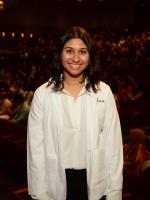
Aditi Kulkarni
NIH Cambridge Scholar MD/PhD
B.A., Swarthmore College, 2017
M.D., University of Minnesota Medical School (In progress)
Dr. Zuhang Sheng (NINDS)
and Dr. Andras Lakatos (Cambridge)
Neuroscience, Cell Biology, Autophagy
Originally from St. Paul, Minnesota, Aditi attended Swarthmore College in Pennsylvania. There, she majored in chemistry and minored in math. During her undergraduate studies, she joined the lab of Dr. Jessica Sarver, studying the differential lipid binding properties of alpha synuclein, the basis of Lewy bodies in Parkinson’s disease.
After graduating from Swarthmore in 2017, she joined the lab of Dr. Sandra Maday at the University of Pennsylvania. She studied the regulation of autophagy in neurons and astrocytes, showing that astrocytes are able to more robustly activate autophagy compared to neurons. These findings raised new questions about intercellular coordination within the brain to maintain homeostasis and resulted in a first- author publication in the journal Autophagy.
Aditi entered the University of Minnesota Medical School in 2020, where she joined the lab of Dr. Andrew Venteicher, a neurosurgeon MD PhD. There, she studied the molecular subgroups of the developing notochord in relation to chordoma, a rare skull-based cancer thought to originate from notochord remnant. Along with the exposure to new techniques, this experience helped Aditi to solidify her goal of becoming a physician-scientist. After completing her first two years of medical school, Aditi joined the NIH OxCam program for her PhD. She is mentored by Dr. Zuhang Sheng (NINDS) and Dr. Andras Lakatos (Cambridge).
After completing her PhD, Aditi will complete her MD at the University of Minnesota. Outside of the lab, Aditi enjoys attempting new recipes, running, and knitting.
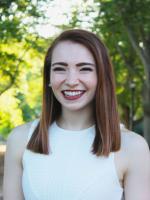
Alaina Shreves
NIH Oxford Scholar
B.S. Neuroscience & Public Health,
The College of William and Mary, 2018
M.S. Epidemiology, Harvard T.H. Chan School of Public Health, 2022
Dr. Charles Matthews (NCI), Prof. Aiden Doherty (Oxford), and Prof. Ruth Travis (Oxford)
Chronic disease epidemiology, Machine learning, Wearable sensors
Alaina graduated from the College of William and Mary with a BS in Neuroscience and Public Health. As an undergraduate, she participated in the Amgen Scholars Program at the National Human Genome Research Institute (NHGRI) of the National Institutes of Health (NIH), where she studied the life course epidemiology of disorders identified through the newborn heel prick test.
She then worked as a postbaccalaureate fellow at the National Cancer Institute (NCI) under the supervision of Dr. Robert Hoover, gaining experience in study management through the development of the Connect for Cancer Prevention cohort.
Alaina earned an MS in Epidemiology and Biostatistics from the Harvard T.H. Chan School of Public Health. As a graduate research assistant with Dr. Lorelei Mucci, she investigated quality-of-life outcomes and sleep among prostate cancer survivors in the Health Professionals Follow-up Study.
She is now pursuing a DPhil at the University of Oxford and the National Cancer Institute. Her research focuses on physical activity and chronic disease prevention, leveraging wearable data from large population cohorts. She is co-supervised by Professor Aiden Doherty (Oxford Population Health), Professor Ruth Travis (Oxford Cancer Epidemiology Unit), Dr. Adam Lewandowski (Oxford Population Health), and Dr. Charles Matthews (NCI Metabolic Epidemiology Branch).
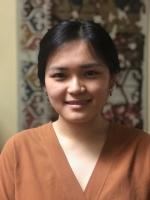
Alia Welsh
NIH Oxford Scholar MD/PhD
B.S. Microbiology, Immunology, and Molecular Genetics,
University of California, Los Angeles, 2016
M.D., University of Illinois-Chicago College of Medicine (In progress)
Dr. Stefan Muljo (NIAID)
and Prof. Anindita Roy (Oxford)
Fetal hematopoiesis, fetal origins of leukemia, hematopoietic stem cell transplantation
Alia graduated from the University of California Los Angeles with a B.S. in Microbiology, Immunology, and Molecular Genetics. She worked in the lab of Dr. Amy Rowat investigating the molecular underpinnings of pancreatic cancer cell deformability and stiffness. After graduation, Alia worked as a research technician in the lab of Dr. Clifford Lowell at the University of California San Francisco, where she studied regulators of innate immune signaling and assessed their potential as immunotherapy targets. She is currently attending medical school at the University of Illinois Chicago and is part of their Medical Scientist Training Program. Alia will now be working with Dr. Stefan Muljo at NIAID and Dr. Anindita Roy at Oxford to investigate mechanisms underlying the transition from fetal to postnatal hematopoiesis and their role in the development of hematological diseases.
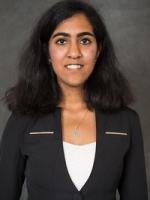
Anagha Krishnan
NIH Cambridge Scholar
B.S. Biomedical Engineering, Georgia Institute of Technology, 2019
Dr. Grégoire Altan-Bonnet (NCI)
and Prof. Martin Miller (Cambridge)
Tumor heterogeneity, Tumor-immune microenvironment, Immunology
Anagha graduated with Highest Honors from the Georgia Institute of Technology as a Stamps President's Scholar in May 2019. As an undergraduate supervised by Dr. Krishnendu Roy, she developed three-dimensional microfluidic models to study the interactions between fibroblasts and stromal cells during lymphatic vasculature formation. She has also worked on projects at the University of North Texas and the University of Texas at Dallas; she developed phononic crystals for improved ultrasound imaging and ran a computational analysis of migraine drug targets, respectively. Her research has been recognized by several awards, including the MARS Generation 24 Under 24 Award, the Alfred H. Gibeling Research Award, and the Goldwater Scholarship (which she received as a high school senior at the Texas Academy of Mathematics and Science). Following graduation, Anagha worked at Glympse Bio, where she assisted with assay development and animal testing for active protease sensors that noninvasively monitored patient response to immunotherapy.
In addition to her research interests, Anagha is extremely passionate about STEM education and outreach; as an undergraduate, she co-founded an organization that used computer science education to improve young womens’ self-efficacy. To further her interests in education, Anagha was awarded a Fulbright Grant in 2019 and served as a visiting lecturer at Uva Wellassa University in Sri Lanka.
For her thesis work, Anagha will be studying how intratumor heterogeneity affects immune response in a variety of cancers. She intends to attend medical school after the completion of her doctorate.
Ann Ly
NIH Oxford Scholar MD/PhD
B.S., University of California, Los Angeles, 2021
M.D., University of California, Davis (In progress)
Dr. Adrian Wiestner (NHLBI)
and Prof. Anna Schuh (Oxford)
Cancer Biology, Immunology, Bioinformatics
Ann researches the diverse trajectories of stem cells in regenerative medicine and cancer.
She graduated summa cum laude from UCLA, where she became interested in the ability of cells to alter their fates. At UCLA under the guidance of Dr. John Adams, she researched alternative splicing of RNA in bone marrow stem cells that differentiate into adipocytes or osteoblasts at the Orthopaedic Hospital Research Center. After graduating from UCLA in 2021, she spent two years in the Dr. Arnold Chin Lab at the UCLA David Geffen School of Medicine elucidating the relationship between the immune system and bladder cancer in patients. In 2023, she began her training as a MD/PhD student at University of California Davis School of Medicine.
As an NIH-Oxford Scholar, Ann will investigate the cancer-immune connection with mentorship from Dr. Adrian Wiestner (NHLBI) and Professor Anna Schuh (Oxford). She will harness insights from computational analyses of chronic lymphocytic leukemia (CLL) cells to uncover the mechanisms that allow them to proliferate over time and dampen the immune system response.
In her free time, Ann enjoys producing her own music, playing violin in orchestra, and drawing new fashions.
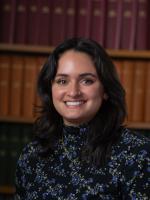
Anna Verghese
NIH Oxford Scholar
B.A., University of California, Los Angeles (UCLA), 2023
Dr. Angela Langdon (NIMH), Prof. Andrew Sharott (Oxford), and Prof. Mark Walton (Oxford).
Systems and Cognitive Neuroscience, Neuropsychiatric Disorders, Neuroeconomics
Anna graduated with a Bachelor of Arts in Economics and a minor in Neuroscience from the University of California, Los Angeles (UCLA) with honors. Through her work in economics, she became interested with not only how people make decisions (economics) but also in the biological basis of decision making (neuroscience). Through the Interdisciplinary Sustainable LA Grand Challenge (SLAGC) Scholar Program, she worked with Dr. Melissa Sharpe to conduct an independent project on sensory-specific cue associations and the neural learning circuits underlying maladaptive behavior in addiction in rodent models, culminating in her honors thesis. During her final year, she worked as a lab technician for the Sharpe lab to conduct research on nucleus accumbens dopamine release and its role in learning. Her diverse undergraduate experiences inspired her to combine her skillsets and interests to pursue research in decision making, learning, and memory.
She then joined Dr. Andrew Sharott at the University of Oxford to work on projects utilizing high density in-vivo electrophysiological recordings with deep brain stimulation in freely behaving rodents. By investigating memory and cognitive function, these experiments aim to develop a closed loop stimulation approach with potential clinical applications.
Leveraging her research experience using cutting edge techniques and her unique interdisciplinary background, she intends to answer questions about the fundamental mechanisms of decision making and provide new insights into the relationship between neuropsychiatric disorders and decision making deficits in her PhD. Through a joint collaboration between Dr. Angela Langdon (NIMH), Dr. Andrew Sharott (Oxford), and Dr. Mark Walton (Oxford), Anna will be using a combination of electrophysiology, computational modeling, and reward-guided behavior to dissect the neural mechanisms of cost-benefit decision making and dopamine release.
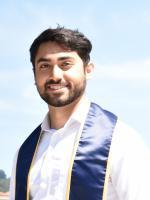
Asmaysinh Gharia
NIH Cambridge Scholar
B.A., Molecular & Cell Biology,
University of California Berkeley, 2018
Dr. Iain Fraser (NIAID) and
Dr. George Malliaras (Cambridge)
Cellular immunotherapy, Microelectromechanical systems, Personalized medicine
As an undergraduate at the University of California Berkeley, Asmaysinh studied molecular biology with an emphasis in immunology. In addition to his coursework, he developed microfluidic interfaces for silicon photonic biosensors under the supervision of Professor Vladimir Stojanvoic in the department of electrical engineering and computer science. In particular, Asmaysinh engineered multilayer microfluidic packaging to overcome the unique challenges of interfacing with small footprint integrated circuit devices while allowing for photonic access. Upon graduating in 2018, Asmaysinh gained additional experience as a research and development engineer in the lab of Professor Mekhail Anwar at the University of California San Francisco (UCSF) in the department of radiation oncology. Here he played diverse roles in microfabrication, bioconjugation chemistry, cell culture, and software development in a continued collaboration with electrical engineering groups at Berkeley with the ultimate goal of creating implantable diagnostic sensors for highly personalized cancer therapy.
In his graduate studies, Asmaysinh hopes to leverage advances in microelectronics and immunology to develop a platform to generate cellular therapies. He strives to commercialize such high efficiency platforms to reduce the cost of personalized immunotherapies and ensure their universal accessibility.
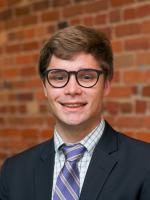
Ayden Case
NIH Gates Cambridge Scholar
B.S., Duke University, 2022
Dr. Claudia Kemper (NHLBI)
and Prof. Ziad Mallat (Cambridge)
Immunology, Cardiovascular Disease, Health Disparities
Ayden became fascinated with the immune system during his undergraduate studies at Duke University, particularly with respect to its therapeutic applications for complex diseases. He pursued this interest through his translational glioblastoma research, studying engineered cytotoxic T cells alongside the cancer’s immune microenvironment. In this midst of this research, Ayden also began to question the accessibility of scientific advancements, especially in the context of clinical medicine. Accordingly, he investigated the barriers to care and adverse health outcomes faced by Native Americans in North Carolina. Through the NIH OxCam program and Gates Cambridge scholarship, Ayden will continue this work under the supervision of Prof. Ziad Mallat and Dr. Claudia Kemper, where he will study the cellular immunology underlying atherosclerosis and other types of chronic inflammation. Given the disparate impact of heart disease on racial and ethnic minority groups within both the US and UK, such advancements are poised to have a significant social impact. Following his studies at Cambridge, Ayden intends to pursue medical education in the US. Through his research, Ayden hopes to develop immunologic treatments for cardiovascular pathologies, alleviating the burden of heart disease on individuals and their communities.
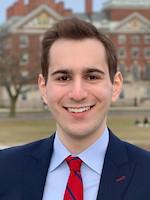
Benjamin Lee
NIH Oxford Scholar
A.B. Computer Science, Harvard University, 2020
Dr. Eugene Koonin (NLM) and
Prof. Peter Simmonds (Oxford)
Virology, Computational biology, Infectious disease
Benjamin graduated from Harvard University with a degree in computer science in 2020. As an undergraduate, he focused extensively on research, with topics ranging from robotic chemical synthesis to nutritional science to biological defense. Beginning his sophomore year, Benjamin worked with collaborators at Indiana University and MIT to develop a robotic system capable of synthesizing peptides and peptoids. He continued this research as an undergraduate research fellow in the lab of George Church at Harvard Medical School during his junior year and remains the lead software developer of the project. Additionally, Benjamin developed software for the optimization of daily meal plans. For this work, he was given the Emerging Leader in Nutrition award by the American Society for Nutrition at their national convention.
Since his sophomore year, Benjamin has worked at Lab41, the machine learning research lab of In-Q-Tel, the venture capital arm of the US Intelligence Community. There, he has focused on developing bioinformatic methods for determining the origin of outbreaks of infectious disease as well as identifying and attributing deliberate genetic engineering in pathogens from sequencing data. At In-Q-Tel, he has published four papers, all as first or sole author, and presented at several international conferences.
As an NIH Oxford scholar, Benjamin will be joining the labs of Dr. Eugene Koonin at NCBI and Prof. Peter Simmonds at Oxford. He intends to focus on metagnomics-based pathogen discovery and comparative genomics. Outside of academia, he enjoys contributing to open-source software development, listening to audiobooks, and experimenting with cooking.
Benjamin Simon
NIH Oxford Scholar
B.S.E. in Biomedical Engineering and B.A. in Computer Science,
Duke University, 2023
Dr. Ismail Baris Turkbey (NCI)
and Prof. David Clifton (Oxford)
Machine Learning Diagnostic Technology, Disease Risk Prediction
Benjamin Simon graduated with Distinction from Duke University in May 2023, earning a dual degree in Biomedical Engineering and Computer Science. He pursued undergraduate research under the mentorship of Dr. Nimmi Ramanujam, designing a machine learning and analysis pipeline to segment and analyze vascular features of mammary tissue in a mouse model. This project paved the way for his excitement for algorithmic design and the potential for such technologies based in machine learning to increase accuracy and efficiency of certain medical decisions and analyses.
Benjamin has also worked on various other projects at Duke University for which his work has been recognized by multiple awards, including four consecutive Undergraduate Assistantship Grants, a Student Marshal title, and a Rhodes Scholarship Nomination. In addition, he received the UCLA Research Excellence Award for his fellowship project on disease progression of complex mental health disorders using natural language processing of Electronic Health Record notes and latent dirichlet allocation under the guidance of Dr. Loes Olde Loohuis and Juan de la Hoz.
Outside of research, Benjamin is passionate about teaching and education. He taught multiple courses as a teaching assistant during his time at Duke in the Biology and Computer Science departments through which he came to love teaching and mentoring his students. Looking ahead, through the NIH OxCam program Benjamin will work with Dr. Baris Turkbey at the NCI and Dr. David Clifton at Oxford with a focus on building machine learning algorithms for cancer risk prediction. Additionally, he remains committed to furthering his training in education and teaching.
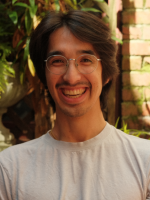
Benjamin L. Sievers
B.A., Pitzer College, 2022
Dr. Robert Seder (NIAID/VRC)
and Prof. Ravindra K. Gupta (Cambridge)
Cancer biology, Virus-host interactions, Measles eradication
Ben first became fascinated with viruses and immunity while consuming David Quammen’s Spillover: Animal Infections and the Next Human Pandemic which led him to his first research position at the J. Craig Venter Institute in La Jolla California. Mentored by Dr. Gene S. Tan, Ben characterized antibody-mediated and T-cell derived protection against a variety of viral pathogens including Zika, Dengue, SARS-CoV-2, and influenza. Recognizing the essential role that vaccination plays in saving lives, Ben spent a year in Cambodia supported by a Fulbright Research Scholarship to explore the possibility of measles self-vaccination in the floating villages of Prek Toal. Further seeking to understand viral surveillance and infection control measures, Ben performed novel bat viral surveillance in bat caves along the remote Laotian border, and conducted H5N1 outbreak control throughout the live-animal markets of Cambodia. Earlier, during his undergraduate studies, Ben participated in Pitzer College’s first “Inside-Out” cohort where he took classes alongside incarcerated men at California Rehabilitation Center in Norco, the nation’s first bachelors degree program for the incarcerated.
As an NIH OxCam scholar, bringing evolving findings describing the necessary elements of successful viral clearance to vexing human cancers that evade immune clearance, Ben is applying spatial transcriptomics to characterize both innate and adaptive immunity towards both viral pathogens and cancer.
Ben is enthusiastic to collaborate with others who wish to join a global movement to employ novel technologies to more safely and comprehensively offer lifesaving vaccinations.
Ben loves music and spends his time free time playing the accordion and all-things-Bach on the piano. In Cambodia, Ben started training in Muay Thai, Khun Khmer, and British boxing which he continues today. He also loves his dogs and is currently learning how to cook. Ben is also getting into white water kayaking.
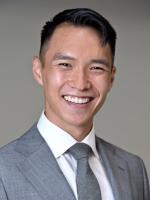
Byron Mui
NIH Cambridge Scholar MD/PhD
B.A. Integrative Biology,
University of California, Berkeley, 2015
M.D., Icahn School of Medicine at Mount Sinai (In progress)
Dr. Pamela G. Robey (NIDCR),
Dr. Marc Ferrer (NCATS), and
Prof. Kevin Chalut (Cambridge)
Stem cell biology, Regenerative medicine, Drug development
During his undergraduate career at UC Berkeley, Byron studied cataractogenesis and supported the development of gelatin microbead templated chambers in hydrogel as a platform to engineer lens organoids. The latter project inspired a fascination for biomimetic designs and their applications in modeling biological systems and in therapeutic development. At the Icahn School of Medicine at Mount Sinai, he continued this area of research but with a focus on its connection to clinical therapies. He evaluated genipin cross-linked fibrin as an injectable, cell- and compound-delivering biomaterial to repair the intervertebral disc after herniation as a member of Dr. James Iatridis’s Spine Bioengineering Lab. He then joined the Medical Research Scholars Program under the supervision of Dr. Pamela G. Robey to explore human bone marrow stromal cells embedded in fibrin microbeads as a repair strategy for focal articular cartilage defects in animal models. These collective experiences have cultivated Byron’s passion for stem cell biology, and as a future MD/PhD, aspires to apply his research background to the development of regenerative therapies.
Moving forward, Byron will study the biomechanical and chemical signaling pathways involved in skeletal modeling with the goal of developing novel treatment modalities for bone fractures. As a solar-powered individual, Byron plans to spend his free time biking and playing tennis. Additionally, in caring deeply about environmental sustainability, he aims to participate in organizations that support local farms and communities through green practices like composting.
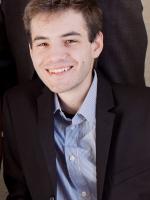
Christian Lantz
NIH Oxford Scholar
Dr. Derek Narendra (NINDS) and
Prof. Matthew Wood (Oxford)
Genetic disease
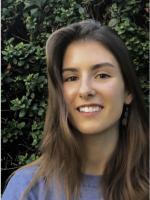
Corinne Donnay
NIH Oxford Scholar
Dr. Daniel Reich (NINDS) and
Prof. Heidi Johansen-Berg (Oxford)
Neuroscience, Cognitive & psychiatric disorders
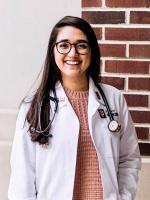
Cristina Contreras Burrola
B.S. Biological Engineering, Massachusetts Institute of Technology, 2017
M.D., Indiana University School of Medicine (In progress)
Dr. Rosandra Kaplan (NCI) and
Prof. Francesca Buffa (Oxford)
Pediatric oncology, Tumor immunology, Tumor microenvironment and metastasis
I was born and raised in Chihuahua, Mexico before moving to the US as a freshman in high school. It was my love for the sciences that allowed me to overcome inherent cultural barriers and connect with others. I graduated from the Massachusetts Institute of Technology (MIT) in 2017 with a B.S. in Biological Engineering. As an undergraduate, I joined Dr. Robert Langer’s lab and worked on the development of novel biodegradable scaffolds for tissue engineering. In addition, I designed microfluidic devices for both nanoparticle synthesis and tissue culture through two internships. My interest in medicine and clinical research was solidified after spending a summer investigating influenza in immunocompromised patients in the lab of Dr. Richard Webby at St. Jude Children’s Research Hospital.
After graduating from MIT, I joined Dr. Sarah Tasian’s group at the Children’s Hospital of Philadelphia (CHOP) where I collaborated in multi-institutional precision medicine studies and investigated the use of novel targeted therapies. My work at CHOP opened my eyes to a career as a physician-scientist in hematology/oncology. Thereafter, I began my medical training at the Indiana University School of Medicine. Supported by the American Society of Hematology, I worked with Dr. Christopher Dvorak at the University of California, San Francisco investigating curative options in hematology. I then joined the NIH-Medical Research Scholars Program to expand my skills as a scientist and understand the mechanisms behind different targeted therapies. As part of Dr. Rosandra Kaplan’s lab, I have been characterizing the role of myeloid cells in solid tumor progression and metastasis.
Under the supervision of Dr. Rosandra Kaplan at the NCI and Prof. Francesca Buffa at Oxford, I will be continuing this work as an NIH-OxCam Scholar. My goal is to further our understanding of tumor immunology to identify new therapeutic targets in pediatric cancers.
I absolutely love to spend my free time being outdoors with my dog, Moss. Some of my favorite activities include hiking, camping, kayaking, and skiing. While outdoors, I also like to practice my amateur photography skills and compete against my friends’ iPhone cameras. Additionally, you can find me at the local pub trivia night being the best moral support on the team.
Since graduating college, I have continued to volunteer for Camp Kesem in an advisory role. This nationwide organization provides year-round support for children whose parents have been affected by cancer.
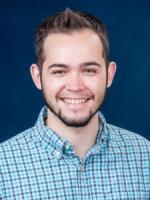
Dalton Hermans
NIH Cambridge Scholar MD/PhD
B.S. Molecular Biology, University of Wisconsin-Madison, 2017
M.D., University of Minnesota Medical School (In progress)
Dr. Robert Seder (NIAID-VRC) and
Prof. John Marioni (Cambridge)
Immunology, Cancer biology, Transcriptomics
Dalton graduated with distinction from the University of Wisconsin-Madison in 2017 with a degree in Molecular Biology and a certificate in Stem Cell Sciences. During undergraduate at Madison, Dalton worked for four years in the lab of Dr. Bikash Pattnaik where he helped develop a disease model of Leber’s Congenital Amaurosis using induced pluripotent stem cells derived from a patient born with the disorder. Dalton spent his undergraduate summers performing research as part of the Pediatric Oncology Education Program at St. Jude Children’s Research Hospital in Memphis, TN. He worked with Dr. Richard Webby and Dr. Paul Thomas, studying adaptive and innate immune responses to influenza virus infection.
After graduating from university in 2017, Dalton joined the lab of Dr. Warren Leonard in the National Heart, Lung, and Blood Institute as a postbaccalaureate IRTA fellow. In Dr. Leonard’s lab, Dalton studied the ability of immune signaling molecules called cytokines to induce disparate metabolic states in CD8+ T cells and described how those metabolic alterations contribute to anti-tumor immunity. This work was published in the Proceedings of the National Academy of Sciences in 2020.
Dalton entered the Medical Scientist Training Program at the University of Minnesota Medical School in 2019 and completed two years of medical training before joining the Oxford/Cambridge Scholars program for his PhD. As an NIH-Cambridge scholar, Dalton is mentored by Dr. Robert Seder (NIAID) and John Marioni (Cambridge). His project focuses on the characterization of CD8+ T cells following vaccination with a novel cancer vaccine developed in the Seder lab.
After the completion of his MD and PhD degrees, Dalton aspires to train as a Pediatric Oncologist and work as a physician scientist at an academic medical center.
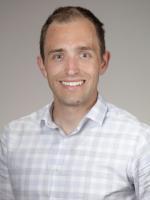
Daniel Rosoff
NIH Oxford Scholar
A.B./Sc.B., Economics and Neuroscience,
Brown University, 2016
Dr. Falk W. Lohoff (NIAAA), Prof. George Davey Smith,
and Prof. David Ray (Oxford)
Genetics and genomics, Neuroscience
Daniel graduated from Brown University with an A.B./Sc.B in Economics and Neuroscience. While at Brown, he was a member of the varsity baseball team and researched the formation of Martian gullies in the Planetary Geosciences Group. During a leave of absence from Brown, Daniel founded and was Executive Director of a 501c3 non-profit, TRB Baseball, which provided sports, training, college advising, and educational opportunities for inner-city youth in Durham, North Carolina. Since graduation, he has been an NIH Post-baccalaureate Intramural Research Training Award Fellow in the Section on Clinical Genomics and Experimental Therapeutics (CGET) at the National Institute on Alcohol Abuse and Alcoholism (NIAAA), where his research has focused on leveraging population genetics to examine the causes and consequences of alcohol abuse and alcohol use disorder.
His research at the NIAAA has resulted in seven co-authored publications and six first-author publications. Daniel has also had the opportunity to present his work at conferences in the United Kingdom (Mendelian Randomization Conference, University of Bristol), and at the World Psychiatric Genomics Conference (Anaheim, California). As an NIH-OxCam Scholar, Daniel will use multi-omic and genetic approaches to examine how epigenetic and environmental risk factors impact disease risk.
Dawid Maciorowski
NIH Cambridge Scholar MD/PhD
B.A., Loyola University Chicago, 2021
M.D., University of Wisconsin-Madison School of Medicine (In progress)
Dr. Jeff Cohen (NIAID) and
Prof. Mark Howarth (Cambridge)
Protein engineering, Virology, Biosecurity
Dawid was born in Bialystok, Poland and moved to Chicago, USA at a young age. Dawid began his research at Loyola University studying antibody engineering against Ebola as part of a joint project with the United States Army. Near the start of his junior year of college, the SARS-CoV-2 pandemic began, and he transitioned to Harvard university to join the effort in designing a COVID-19 vaccine. Dawid is currently studying protein engineering methods to create rationally designed vaccines.
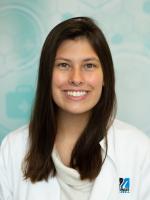
Devon Hartigan
NIH Oxford Scholar
B.S.E., University of Massachusetts-Lowell, 2023
Dr. Kaitlyn Sadtler (NIBIB)
and Prof. Molly Stevens (Oxford)
Tissue Engineering, Immunoengineering, Biomaterials

Douglas Fritz
NIH Cambridge Scholar MD/PhD
B.S., Saint Louis University, 2019
M.D., University of Colorado (In progress)
Dr. Leah Katzelnick (NIAID) and
Prof. Henrik Salje (Cambridge)
Virology, Planetary Health, Vaccine Design, Computational Biology, Public Health
Douglas is from St Louis, MO where he went to undergrad and studied Biology and American Studies while conducting research on TB, Chagas, and Th17 interactions (Dan Hoft Lab). Following graduation, he completed a Fulbright Scholarship in North Macedonia and returned to the NIH to study flavivirus antibody epitope repertoire characterization and correlates of vaccine protection (Ted Pierson Lab). During the beginning of his MD/PhD training at the University of Colorado, he further explored his interests through research projects in machine learning, women's health, and climate health resiliency. He looks forward to leveraging his eclectic training towards advancements in systems-based virology and climate-informed-approaches to infectious disease and public health as a physician scientist.
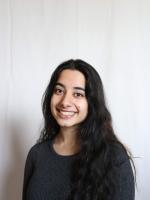
Eesha Bharti
NIH Cambridge Scholar
B.S., University of Minnesota, 2022
Dr. Sarah Lisanby (NIMH) and
Prof. Valerie Voon (Cambridge)
Psychiatry, Neuromodulation, Computational neuroscience
Eesha graduated summa cum laude from University of Minnesota in 2022 with a B.S. in Neuroscience and minors in Spanish and Math. As an undergraduate, she was awarded a research grant to fund an independent study on the changes in beta-band neural activity with the progression of Parkinson’s disease under the supervision of Dr. Jerrold Vitek. This project deepened her interest in computational neuroscience, inspiring her to join other projects within the lab to study Parkinson’s disease and deep brain stimulation (DBS) from multiple angles. In 2021, Eesha conducted research at the Cajal Institute in Madrid under the supervision of Dr. Jose Luis Trejo, studying the role of various hormones or behaviors in adult hippocampal neurogenesis. After graduating, she joined Dr. Sarah Lisanby at the National Institute of Mental Health (NIMH) in pursuit of continuing with neuromodulation research, specifically in relation to psychiatric disorders. Here, she led a project using real-time neural activity to trigger transcranial magnetic stimulation (TMS) and another using TMS to measure the effect of ketamine as a treatment for treatment resistant depression (TRD).
During her graduate study as an NIH Cambridge Scholar, Eesha will work to create a model that encompasses multiple rapid-antidepressant treatments (e.g. TMS, electroconvulsive therapy, DBS) for TRD. Concurrent analysis of different treatments would allow for direct comparison of the different biomarkers and mechanisms thus helping to better signal toward one treatment or another for future patients.
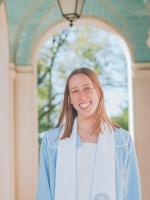
Emery Hoos
NIH Oxford Scholar
B.S.P.H. Environmental Health Sciences and B.A. Biology,
University of North Carolina at Chapel Hill, 2024
Dr. Sri Krishna (NCI), Dr. Malcolm Sim (Oxford),
and Dr. Timothy Elliott (Oxford)
Cancer immunotherapy, Neoantigen identification, Adoptive cell therapy
Emery graduated with highest honors from the University of North Carolina at Chapel Hill in 2024, where she studied public health and biology. Working with Dr. Rebecca Fry, her undergraduate research focused on epigenetic differences related to endometrial cancer, specifically those underlying to molecular subtypes and survival. She utilized publicly-available data from The Cancer Genome Atlas, then moved to incorporate further data from UNC patients. Emery also worked for a summer in the lab of Dr. Robert Seder, exploring CD8+ T cell phenotype in cancer vaccines and adoptive cell therapy.
Emery is excited to apply these previous research experiences to her work with Dr. Sri Krishna (NCI), Dr. Malcolm Sim (Oxford) and Dr. Timothy Elliott (Oxford), where she will characterize differences in avidity and affinity of neoantigen-specific T cell receptors to better understand the ideal candidates for cellular therapies in cancer.
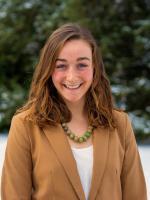
Emily Steffke
NIH Marshall Scholar
Dr. Masaki Terabe (NCI) and
Prof. Benoit Van Den Eynde (Oxford)
Cancer biology, Glioblastoma, Vaccine development
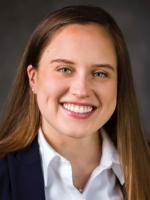
Emily Beltran
NIH Cambridge Scholar MD/PhD
B.S. Biological Sciences, The University of Chicago, 2017
M.D., Rush Medical School (In progress)
Dr. Claudia Kemper (NHLBI) and
Prof. Menna Clatworthy (Cambridge)
Tissue-specific immunology, Immunometabolism, Translational research
Emily’s interest in science started in high school through a research experience at the Illinois Institute of Technology where she studied blood flow dynamics in patients with renal disease. Her project was awarded a semifinalist prize in the Siemens Competition in Math, Science, and Technology. Motivated by her high school work, she pursued several international science programs, including summer research at the Institut Pasteur in Paris and the Dr. Bessie F. Lawrence Summer Science Institute at the Weizmann Institute of Science in Israel. Together, these experiences sparked a lasting interest in using research to understand complex biomedical questions.
Emily graduated from the University of Chicago with a B.S. in Biological Sciences, specializing in immunology. As an undergrad, she worked in Cathy Nagler’s translational immunology lab studying the relationship between gut bacteria and food allergies and completed an honors thesis investigating the ability of high fiber diets to expand populations of barrier-strengthening gut bacteria that can prevent the development of food allergies. Her thesis work uncovered a specific fiber structure that was preferentially utilized by the microbiota to improve gut health, which has since been further developed for therapeutic use by a company started through the lab. Emily also took advanced graduate immunology and microbiology coursework. She became fascinated with the immune system and its immense power to maintain human health but also create havoc in disease.
After college, Emily did full-time research at the Rockefeller University in New York City. She worked in Jan Breslow’s metabolism and biochemistry lab studying immune chemotaxis-inducing peptides generated by activation of enzymes in the contact system, an enzyme cascade associated with blood coagulation and inflammation. She elucidated the signaling mechanism of the peptide and therapeutically targeted the pathway in various murine models of immune-mediated diseases. She presented her work at multiple national meetings and was directly involved in developing a clinically relevant, novel small molecular inhibitor for the enzyme of interest.
Inspired by the powerful intersection of medicine and science, Emily applied to medical school, and she completed her preclinical years at Rush Medical College in Chicago. During this time, she was a student ambassador and member of the student curriculum committee. Upon joining the NIH Ox-Cam program, she will build on her previous research background and interest in immunology and study how immune crosstalk between the gut and brain is regulated by immunometabolic pathways. In the future, she hopes to pursue a career as a physician-scientist combining clinical work, translational immunology-focused research, and innovative therapeutic development. Outside of the lab, she enjoys running, swimming, baking, and trying new restaurants.

Erin Walker
NIH Cambridge Scholar MD/PhD
B.S. Microbiology/Bacteriology, Clemson University, 2021
M.D., University of South Carolina School of Medicine (In progress)
Dr. Desmond A. Brown (NINDS)
and Prof. Richard Mair (University of Cambridge)
Glioblastoma, ecDNA, Tumor Heterogeneity
Erin is an MD-PhD student at the University of South Carolina School of Medicine Greenville. Before starting medical school, she researched microbial diversity and ecology, focusing on the shared core genome of microbial endosymbionts within the gill tissue of Lucinid clams under the mentorship of Dr. Barbara Campbell. This work earned her the Outstanding Senior in Discovery Majoring in Microbiology Award.
After matriculating into medical school, Erin was selected as a research scholar in the neurosurgery department at Washington University in St. Louis following her first year. There, she investigated risk factors associated with the up-conversion of dural arteriovenous fistulas (PMID: 38428013). In 2023, Erin joined the NIH Medical Research Scholars Program, working in the lab of Dr. Desmond A. Brown. Her research focused on the metabolic, pharmacokinetic, and pharmacodynamic changes in glioblastoma following exposure to non-camptothecin inhibitors. During this time, she also co-authored multiple manuscripts and a book chapter.
Erin will continue her doctoral studies with Dr. Brown, alongside Dr. Richard Mair at Cambridge University. Her research will explore the links between glioblastoma extrachromosomal DNA and tumor behavior. Upon completing her doctoral studies, Erin aspires to pursue a research-oriented career as a neurosurgeon-scientist, integrating research and patient care to improve outcomes and overall survival for brain tumor patients.
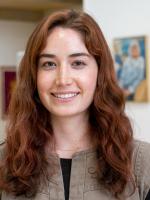
Evelynne Fulda
NIH Oxford Scholar
B.A., Integrative Biology, Harvard University, 2019
M.Sc., Global Health Science and Epidemiology, University of Oxford, 2023
Dr. Joshua Denny (NHGRI)
and Prof. Aiden Doherty (Oxford)
Epidemiology, Genomics, Wearables
Evelynne graduated from Harvard College with a BA in Integrative Biology. While an undergraduate student, she worked in the labs of Dr. Alan Bergland (University of Virginia), investigating quantitative genetic markers in Drosophila, Dr. Melissa Knauert (Yale School of Medicine), investigating sleep deprivation in critically ill patients, and Dr. Lisa Fucito (Yale School of Medicine), investigating sleep interventions for the prevention of alcohol use disorder in young adults.
After graduation, Evelynne worked as a clinical research coordinator at the Massachusetts General Hospital in the Metabolism Unit, where she was supervised by Dr. Markella Zanni, Ms. Kathleen Fitch, and Dr. Steven Grinspoon. Her research focused on prevention and treatment of cardiometabolic disease among people ageing with HIV.
Evelynne then pursued an MSc in Global Health Science and Epidemiology at the University of Oxford. She completed her master’s dissertation in the lab of Prof. Aiden Doherty, investigating the association between device-measured physical activity and risk of non-alcoholic fatty liver disease. She continued this work as a Trainee Fellow at Oxford’s Big Data Institute, where her research sought to integrate wearable accelerometer, imaging, and genetic data to further understand the association between physical activity and cognitive decline.
As an NIH Oxford Scholar, Evelynne will explore associations between physical activity and disease with respect to reverse causation. This work will leverage data from wrist-worn accelerometers and genomics from large biobank cohort studies, including All of Us and the UK Biobank. She will be supervised by Dr. Joshua Denny (NHGRI) and Prof. Aiden Doherty (Oxford).
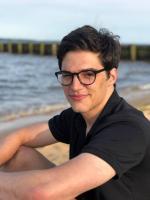
Francisco Battiti
B.S. in Specialized Chemistry, BSLAS in Physics
Dr. Amy Newman (NIDA) and
Prof. Timothy Donohoe (Oxford)
Organic chemistry, GPCR signaling, Neuroscience
Francisco Battiti, grew up in Honduras and moved to the USA shortly before beginning college. Francisco is immensely passionate about organic chemistry, where scientific determination and artistic spirit clash to form that he believes to be the most creative of all the sciences.
Francisco is a big non-fiction reader, big time Liverpool FC fan, avid soccer/tennis player, and strong believer that staying in and watching TV is largely underrated.
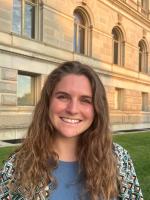
Gabi Dugan
NIH Oxford Scholar
B.S. Biological Systems Engineering, Virginia Tech, 2022
Dr. Armin Raznahan (NIMH) and
Prof. Jason Lerch (Oxford)
Genetics, Computational neuroscience, and neuroimaging
Gabi’s research experience started in a chemical ecology lab with Dr. Susan Whitehead, whose research focused on the evolutionary ecology of plant-animal interactions. She was awarded an undergraduate research grant to fund an independent study using statistical models to test how habitat fragmentation affects ant community composition over time. This work sparked her interest in computational research practices, which supported a transition from environmental sciences to neuro-genetics. As a junior, she was selected for a Research Experience for Undergraduates (REU) in Dr. Noah Snyder’s behavioral genomics lab. She developed a project under the single-cell molecular atlasing initiatives for the rhesus macaque brain to study the cellular heterogeneity of schizophrenia-associated brain regions, including the nucleus accumbens, temporal lobe, thalamus, hippocampus, and prefrontal cortex. This allowed her to gain experiences and skills in transcriptomic neuroscience research. Before graduating, she also worked with a team of eight students to develop a machine organ perfusion preservation system for their senior design project. This system functioned to keep heart tissue viable for transplant by continuously pumping during transportation. She graduated from Virginia Tech with a B.S. in biological systems engineering, gaining wide exposure to environmental, genetic, and biomedical research.
In pursuit of continuing with neuro-genetics, after graduating, she joined the National Institute of Mental Health (NIMH), working in Dr. Francis McMahon’s lab in the Human Genetics Branch. There, she led a project studying the transcriptomic impacts of nine copy number variants (CNVs), which are among the greatest known genetic risk factors for several neuropsychiatric disorders, such as schizophrenia and autism spectrum disorders. She hopes to apply these skills in transcriptomics and in the study of rare high-risk variants to the field of neuroimaging. During her time as an NIH-Oxford scholar, she aims to create a multi-modal project classifying the impacts of genetic variants to better understand the biological underpinnings of their risk for neuropsychiatric conditions.
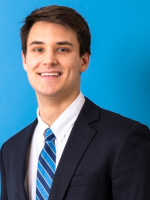
Gerard David Hoeltzel
NIH Oxford Scholar MD/PhD
B.S.E., Chemical and Biomolecular Engineering, University of Pennsylvania, 2017
M.D., Jefferson Medical College (In progress)
Dr. Remy Bosselut (NCI), Dr. Rachael Bashford-Rogers (Oxford),
and Prof. Michael Dustin (Oxford)
Pancreatic Cancer, Immunology, Tumor Microenvironment
Grace Perry
NIH Cambridge Scholar
B.S., University of Massachusetts Dartmouth, 2020
Dr. John Hammer (NHLBI) and
Prof. Marc de la Roche (University of Cambridge)
Cancer biology, Cytoskeletal dynamics, Motor proteins
Grace’s research interests began in Professor Erin Bromage’s laboratory at the University of Massachusetts Dartmouth. As a comparative immunology laboratory, she studied the adaptive immune response in rainbow trout to vaccination, with the goal to improve animal vaccinations for the aquaculture industry. Here, she also contributed to a case study involving the use of bacteriophage therapy for a loggerhead turtle suffering from a persistent bacterial infection as an alternative to antibiotics.
After her graduation in 2020 with a Bachelor of Science in biology, she desired to integrate into oncology research. To achieve this, she joined the laboratory of Dr. Alex Toker at Harvard Medical School, where their research centers around PI3K/Akt cellular signaling and its implications in cellular metabolism in breast cancer. Some of her contributions to the laboratory include aiding in a genome wide CRISPR screen to gain mechanistic insights of pathway crosstalk with PI3K/Akt signaling in ovarian cancer, exploring hits from another genome wide CRISPR screen in triple negative breast cancer (TNBC) with hopes to identify druggable genetic targets that work in synergy with PI3K/Akt inhibitors, and characterizing pTyr sites on metabolic enzymes that are important in TNBC. She has also worked in collaboration with the Dibble laboratory at Harvard Medical School, where she made significant contributions to their work identifying PANK4 as a novel Akt substrate that regulates CoA synthesis from vitamin B5.
As a NIH-Cambridge PhD scholar, she will continue her work in cancer biology. With the mentorship of Professor Marc de la Roche from the University of Cambridge and Dr. John Hammer from the NHLBI, she will explore adenomatous polyposis coli (APC) deregulation in colorectal cancer utilizing organoid models and the implications this deregulation in cytoskeletal rearrangement and motor proteins. Grace has a long-term goal of a career in academia and looks forward to getting involved with science policy in graduate school and after graduation.
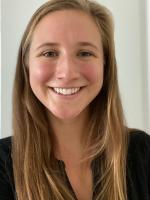
Gretchen Greene
NIH Oxford Scholar MD/PhD
B.A. in Neuroscience, Macalester College, 2017
M.D., Northwestern University Feinberg School of Medicine (In progress)
Dr. Alan Koretsky (NINDS), Prof. Zoltan Molnar (Oxford), and Prof. Francis Szele (Oxford)
Neuroplasticity, Neurodevelopment, and Regeneration
Gretchen graduated summa cum laude from Macalester College in 2017 with a major in Neuroscience. She first participated in research as an undergraduate summer intern in the lab of Dr. Robert Thorne at the University of Wisconsin-Madison. The Thorne lab studied the mechanisms and pathways involved with the delivery of biologics into the central nervous system (CNS) centered on antibody-based therapeutics targeting neurological disorders. Gretchen spent two summers studying Fc receptor distribution within the CNS and brain vasculature focusing on how these receptors impacted the delivery of IgG-based immunotherapies.
After graduating from Macalester, Gretchen received a Fulbright grant to conduct 12 months of research at the University of Bern in the lab of Dr. Britta Engelhardt, studying neuroinflammation and immune cell migration. Specifically, her project focused on immune cell migration into the central nervous system during experimental autoimmune encephalomyelitis, an animal model of multiple sclerosis.
Gretchen then continued neuroscience research as an NIH postbaccalaureate fellow. She evaluated the effect of age on the ability of transplanted neural precursor cells to integrate and form bidirectional connections with the host brain. The CNS generally cannot regenerate damaged neurons following injury or disease, and the ability of transplanted neural stem cells to form an integrated neuronal tissue with bidirectional connectivity may have implications for CNS regenerative medicine.
In 2021, Gretchen entered the MSTP at Northwestern University. She completed two years of medical school before starting her PhD in the NIH OxCam Scholars program. As an Oxford scholar, Gretchen plans to further study neural stem cell transplantation with a focus on elucidating the mechanisms by which the adult rodent brain innervates transplant-derived neuronal tissue under the mentorship of Zoltan Molnar and Francis Szele at the University of Oxford and Alan Koretsky in the National Institute of Neurological Disorders and Stroke

Gretchen Ruschman
NIH Cambridge Scholar
B.S., University of Kentucky, 2024
M.Phil., Medical Science (Obstetrics and Gynaecology), 2025
Dr. Suchitra Hourigan (NIAID), Dr. Priscilla Day-Walsh (Cambridge), and Prof. Steven Charnock-Jones (Cambridge)
Pregnancy Outcomes, Metagenomics, Metabolomics
Originally from Athens, Kentucky, Gretchen attended the University of Kentucky, where she earned a BS in Agricultural and Medical Biotechnology with minors in philosophy and microbiology. There, she joined the labs of Dr. Carlos Rodriguez-Lopez in the Department of Horticulture, studying the role of DNA methylation on soil microbial community assembly, and Dr. Patrick Hannon, where she investigated the impact of endocrine-disrupting chemicals on ovarian function.
Wanting to explore the interaction between microbial communities while continuing to learn about reproductive biology, she joined the lab of Dr. Priscilla Day-Walsh and Prof. Charnock-Jones in the Department of Obstetrics and Gynaecology at the University of Cambridge as an MPhil student. Her research focuses on mechanistically characterizing the effects of maternally derived microbial metabolites and their associated microbes on placental function and pregnancy outcomes.
Following her MPhil, Gretchen will continue to build on this work with Dr. Day-Walsh and Prof. Charnock-Jones at Cambridge, as well as taxonomically and functionally characterizing the maternal gut microbiome across pregnancy with Dr. Suchitra Hourigan at the Clinical Microbiome Unit at the NIAID.
After her PhD, Gretchen plans to pursue a career in academic medicine with a long-term goal of becoming a clinician-scientist dedicated to improving pregnancy outcomes.
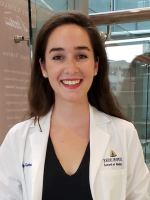
Hallie Gaitsch
B.S., Yale University, 2019
M.D., Johns Hopkins University School of Medicine (In progress)
Dr. Daniel Reich (NINDS) and
Prof. Robin Franklin (Cambridge)
Multiple Sclerosis, Neuroimmunology, Molecular biomarkers
Hallie’s introduction to the world of scientific research began at the Fermi National Accelerator Laboratory in her hometown of Batavia, Illinois. As a high school student, she worked for the Dark Energy Survey identifying strong gravitational lensing candidates in images taken by the Dark Energy Camera through visual and computer analysis. This extraordinary experience sparked her interest in pursuing a career in science. Hallie attended Yale College, graduating in 2019 with a B.S. in Molecular, Cellular, and Developmental Biology with Distinction in the Major. During her undergraduate years, she worked as a research assistant in the lab of Dr. Amy Arnsten at the Yale School of Medicine, where she investigated pharmacologic interventions to treat negative symptoms of schizophrenia using rat models. In the summer of 2016, she was selected to participate in a Research Experience for Undergraduates at the University of Chicago Conte Center for Computational Neuropsychiatric Genomics where she used computer modeling to uncover hidden genetic and environmental correlations between traditionally distinct disease phenotypes. In the summer of 2017, she won a Thouron Scholarship to study in the Pembroke-King’s Programme at the University of Cambridge, during which time she completed a research supervision with Prof. Raymond Bujdoso focusing on the pathogenesis of proteinopathies and prion-related diseases. Her senior thesis at Yale was the culmination of three years of work in the lab of Dr. Erol Fikrig at the Yale School of Medicine investigating the role of the A. aegypti mosquito vector in Zika virus transmission, infection, and pathogenesis.
Hallie joined the Johns Hopkins School of Medicine MSTP in 2019 and has since completed her first two years of medical school. In 2021, she was awarded a Gates-Cambridge Scholarship. As an NIH Gates Cambridge Scholar, Hallie will be undertaking a Ph.D. in Clinical Neurosciences. She aims to draw upon her experiences in wet lab and computational research to complete an interdisciplinary, co-mentored research project in the field of neuroimmunology and, specifically, multiple sclerosis (MS). MS affects millions of people worldwide and often has debilitating outcomes ranging from disrupted sensation and loss of ambulation to cognitive dysfunction and psychiatric problems. Hallie’s project will focus on identifying molecular biomarkers for remyelination using methylation patterns in cell-free DNA released from glial progenitor cells. Hallie hopes that her work will contribute to a greater understanding of this complex disease and provide the ability to quantify the level of myelin regeneration in the brain and spinal cord during clinical trials of remyelinating therapies.
As a future physician-scientist, Hallie aims to devote her career to investigating the processes that govern disease etiology and pathogenesis and applying this knowledge to patient care. After completion of her doctoral training, she plans to finish medical school and then apply to research-focused residency programs in either neurology or neurosurgery. Her goal is to work at an academic medical center dividing her time between clinical work, conducting translational research, and teaching
Outside of the lab, Hallie enjoys reading, writing, playing viola, watching movies, running, and traveling. Her remedies for tough days include drinking plenty of tea (English Breakfast or Earl Grey), diving into a good book, wandering an art museum, listening to Bach’s violin sonatas & partitas, hanging out with her cat, watching a murder mystery (preferably Agatha Christie), and spending as much time as possible among trees.

Hannah Dada
NIH Oxford Scholar MD/PhD
B.A., University of Chicago
Grégoire Altan-Bonnet (NCI) and
Prof. Mike Dustin (Oxford)
Tumor immunology, Immunology, Cancer biology
Hannah developed an interest in research in high school where she was fortunate enough to have basic science exposure. She conducted breast cancer research on signaling pathways that were important to metastasis. The lab focused on RAF kinase inhibitory protein (RKIP) signaling which functions as a metastasis suppressor by inhibiting cell migration, invasion, intravasation into blood or lymph vessels, and extravasation from circulatory vessels. These exciting projects unveiled how exciting science can be because she likened signaling to finding pieces of a puzzle.
Hannah remained in the same research lab during college. This allowed her to delve deeper into her passion for science to uncover more pieces to the puzzle in the RKIP signaling project. From this experience she knew she wanted to further her knowledge in cancer research. Consequently, a cancer project was her only criteria after graduation. Luckily Hannah was able to work on a cancer project during my gap years. Her gap years also afforded her the opportunity to become exposed to Immunology and tumor immunology. She fell in love with this field during my time off. Hannah worked on resistance mechanisms to immunotherapy in melanoma, pancreatic cancer, and breast cancer and learned just how intriguing the human body is. Hannah hopes to further her knowledge in immunology and discover novel ways the body’s best defense can perform its job in the fight against cancer.
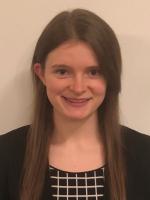
Hannah Duffy
NIH Oxford Scholar
B.S. Neuroscience, University of Delaware, 2019
M.S. Neuroscience, University of Delaware, 2020
Dr. Richard Proia (NIDDK) and
Prof. Frances Platt (Oxford)
Neuroscience, Neurodegenerative disease, Genetics & epigenetics
Hannah graduated summa cum laude from the University of Delaware with a BS in neuroscience and a minor in biology. At UD, she received an honors degree with distinction and became a member of Phi Beta Kappa. Hannah discovered her passion for neuroscience at a university talk on the subject, which motivated her to change her major and explore research. She first got involved in research at university when she spent a summer working in Dr. Mark Stanton’s neurobiology lab. She later joined Dr. Tania Roth’s behavioral epigenetics lab where she completed a senior thesis. The Roth Lab aims to better understand epigenetic and behavioral changes induced by early-life adversity with the ultimate goal of reducing the negative effects of child maltreatment. Hannah remained at the University of Delaware to complete a master’s degree in neuroscience and continue her work with Dr. Roth. Her master’s thesis explored the complex relationship between changes in DNA methylation in blood and brain tissue following early-life adversity. Hannah will continue exploring neuroscience and genetics while working towards her PhD with an additional focus on pathology. As an NIH-OxCam Scholar, she will work with Dr. Richard Proia and Prof. Frances Platt to explore lysosomal dysfunction and neurodegenerative disease, with a particular focus on Gaucher Disease and Parkinson’s Disease.
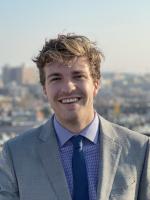
Henry Taylor
B.S. Computational Biology, Duke University, 2018
Dr. Francis S. Collins (NHGRI),
Dr. Joshua C. Denny (NHGRI),
and Prof. John Danesh (Cambridge)
Human genetics & genomics, Common disease, Translational medicine
Henry graduated from Duke University magna cum laude with a degree in computational biology in 2018. Initially planning to study at the intersection of technology and conservation biology, he quickly developed a keen interest in utilizing computational models to investigate the underlying mechanisms of human disease. During his sophomore year, he worked with Dr. G. Allan Johnson at the Duke Center for In Vivo Microscopy building computational tools to visualize and analyze 3D computed tomography (CT) and magnetic resonance imaging (MRI) scans from mammalian brain atlases. Following his time in the Johnson lab, he joined the student-led Bass Connections: Enabling Precision Health and Medicine program and worked with Dr. Gregory A. Wray to investigate virulence of Burkholderia cenocepacia in Cystic Fibrosis patients. These experiences, among others, shaped his determination to pursue a career concentrated on connecting biology, mathematics, and computer science, with a focus on applications to human health.
After graduating from Duke, Henry worked as a software engineer in the DC area before joining the laboratory of Dr. Francis S. Collins at the United States National Institutes of Health (NIH) as a postbaccalaureate IRTA fellow. At NIH, he studied the molecular underpinnings of diabetes using genetic and genomic techniques. Notably, one of Henry’s primary projects involved the largest genetic analysis of microRNA expression in human pancreatic islets to date and helped understand the molecular effects of genetic loci associated with diabetes. During his fellowship, he became acutely aware of the health inequities that persist worldwide and pursued training to prepare himself for a career focused on addressing systemic health inequities.
As an NIH Gates Cambridge Scholar, Henry aims to combine his interests in human disease and global health inequities to study the genetic basis of type 2 diabetes (T2D) across diverse ancestries. Ultimately, he hopes that his doctoral research will enhance the treatment and prevention of T2D for all people.
When he is not in the lab, Henry will use any excuse he can to be outdoors. As a result, unlike most people who choose to be remarkably skilled at a few activities, Henry is remarkably average at many activities. He particularly enjoys hiking, camping, traveling to new places, and daydreaming of his semester spent in New Zealand. During his time in Cambridge, Henry also hopes to become an avid football fan.
Hsu Hnin (Sandra) Mon
NIH Oxford Scholar
B.A. Molecular Biology, Colgate University, 2012
MSPH Global Disease Epidemiology and Control,
Johns Hopkins School of Public Health, 2016
Dr. Thomas Quinn (NIAID) and
Prof. Christophe Fraser (Oxford)
Infectious disease epidemiology, Phylogenetics, Pathogen dynamics, Health & human rights
Born to a family of physicians in Yangon, Myanmar (Burma) and raised across Southeast Asia, Hsu Hnin (Sandra) Mon always harbored a curiosity for biomedicine in the context of shifting social, political, and geographical environments.
Sandra nurtured this curiosity further during her undergraduate days at Colgate University, where she majored in Molecular Biology, minored in Asian Studies, and explored the interdisciplinary linkages between diseases and the communities they impact. She conducted virology research under Dr. Geoffrey Holm, who introduced her to – and fostered her passion for – the field of infectious disease epidemiology.
After her Bachelor’s, Sandra pursued a research assistantship with Dr. Christopher Plowe at the University of Maryland School of Medicine, whose research on the molecular surveillance of artemisinin-resistant P. falciparum malaria expanded her professional ambitions into molecular epidemiology and pathogen genomics.
Sandra then completed a Master of Science in Public Health in Global Disease Epidemiology and Control in the Department of International Health at Johns Hopkins, where she focused on infectious disease epidemiology, humanitarian health, and implementation science. Following her Masters, she joined the Johns Hopkins Center for Public Health and Human Rights (CPHHR) under the mentorship of Drs. Chris Beyrer and Andrea Wirtz. Her research portfolio with CPHHR includes an implementation science study assessing obstacles to and innovations in the HIV care continuum for men who have sex with men (MSM) and transgender women (TGW) in Myanmar; an NIH R01 evaluating the effectiveness and cost-effectiveness of pre-exposure prophylaxis (PrEP) among young MSM and TGW who sell or exchange sex in Thailand; a mixed methods epidemiologic assessment of violence and mortality following the 2017 genocidal campaign against the Rohingya; and most recently, a project documenting and evaluating attacks on healthcare resulting from the 2021 attempted military coup d’état in Myanmar. She also serves as a Commissioner on the International AIDS Society-Lancet Commission on Health and Human Rights.
Today, Sandra’s research interests revolve around infectious disease dynamics, phylogenetic analysis, and health & human rights policy. Through her NIH-OxCam research with Dr. Tom Quinn and Prof. Christophe Fraser, Sandra aims to identify epidemiologic (population- and network-level) and evolutionary (within-host) factors associated with HIV acquisition and pathogenesis. She also intends to apply a human rights lens to this research to understand the role of stigma and other social disparities in perpetuating transmission within identified networks. She hopes that this research will help optimize HIV phylodynamic models to better design effective HIV interventions for the most vulnerable populations.
Beyond her research and health & human rights work, Sandra enjoys cooking, doting on her cats and (pet) rats, and managing her dog’s Instagram.
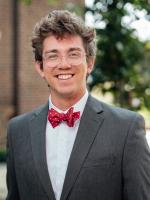
Jackson White
NIH Oxford Scholar
B.S., James Madison University, 2020
Dr. Brant Weinstein (NICHD)
and Prof. Ellie Tzima (University of Oxford)
Mechanobiology, Vasculature, Lymphatics
As a lifelong hemophiliac, Jackson has always been curious about the causes of disease. As an undergraduate, he found a professor, Dr. Nathan Wright, a structural biologist and biophysicist, who was concerned with just that, but on a molecular level. After a brief meeting with Dr. Wright that began with him shoving a pipette in his hand and ended with “see you tomorrow”, Jackson joined the Wright lab. Throughout undergrad, Jackson worked to discern the role of a giant cytoskeletal protein, obscurin, in differential subtypes. Previous work by the lab and others have shown that obscurin plays a major role in force transduction in striated muscle cells. Leaning on the Wright lab’s command of biophysics and the molecular biology and microscopy expertise of a close collaborator, Dr. Daniel Conway, Jackson was able to show that when expressed in breast and epithelial tissue, obscurin’s structure-function relationship is likely conserved. His work landed him presentations at two Biophysical Society Meetings and the Biomedical Engineering Annual meeting as well as the JMU Biochemistry Research Award and JMU Frank A. Palocsay Award in Undergraduate Chemistry Research.
After catching the bug for clinically relevant research and advanced technologies, Jackson headed to Boston, where he began a research associate position at the Broad Institute of MIT and Harvard in the Proteomics Platform. The lab, captained by Dr. Steven A. Carr, is well known for deploying mass spectrometry within a variety of contexts to reveal insights otherwise left shrouded by genomic techniques alone. Jackson spearheaded the Carr lab’s data collection contributions to the National Cancer Institute’s Clinical Proteogenomic Tumor Analysis Consortium (CPTAC). He has generated numerous multi-dimensional data sets for several non-small cell lung cancer cohorts, oligodendroglioma, and adult soft tissue sarcoma. Additionally, he advanced the Carr lab’s technological capabilities, resulting in a new semi-automated high-throughput workflow for highly precious, tissue limited samples.
As a NIH Oxford scholar, he plans to study the impact of mechanosensitive genes on transcription and translation in the vascular and lymphatic systems in zebrafish.
Read more about Jackson at https://www.rdm.ox.ac.uk/people/jackson-white

Jacob Gordon
NIH Cambridge Scholar
B.S. Biology, Appalachian State University, 2018
Dr. Robin Stanley (NIEHS) and
Prof. Alan Warren (Cambridge)
Ribosome assembly, Ribosomopathies, Molecular machines
Jacob Gordon, a native of Stokes County, North Carolina, graduated with university and departmental honors from Appalachian State University in 2018 with a B.S. in Biology. He conducted undergraduate research in the laboratory of Dr. Chishimba N. Mowa for three years. This research investigated the hypothesis that mechanical forces of the growing fetus on the female cervix direct mechano-sensitive cell signaling (mechanotransduction) in cervix tissue remodeling during pregnancy. Jacob’s published undergraduate work showed that certain mechano-sensitive molecules involved in cytoskeletal organization, tissue remodeling, and cell proliferation are dynamically expressed in murine cervix epithelia as pregnancy advances from early to late stages. These three years were formative in Jacob’s passion for research discovery and exploration in the context of human health and disease.
Upon concluding his undergraduate education, Jacob joined the NIH laboratory of Dr. Robin E. Stanley at the NIEHS in Research Triangle Park, NC as a Post-baccalaureate Fellow. For two years, he learned to pursue an integrative experimental approach utilizing biochemistry, structural biophysics, and molecular/cell biology to study pre-ribosomal RNA processing enzymes involved in building the eukaryotic ribosome. He contributed to two published works that uncovered the subcellular spatial regulation and functional catalytic motif elements of an essential pre-ribosomal RNA processing complex in eukaryotes, RNase-PNK. It was during these two years that Jacob became interested in the molecular machines that construct the ribosome, along with the mysterious class of diseases (known as ribosomopathies) that are associated with aberrant ribosome assembly/function in humans.
As an NIH Cambridge Scholar, Jacob is continuing his work on human molecular machines involved in ribosome assembly in the lab of Dr. Stanley at NIEHS. His co-mentor will be Professor Alan J. Warren at the Cambridge Institute for Medical Research, where Jacob will begin to study structural and functional mechanisms of mutant enzyme machinery identified in specific ribosomopathies. Jacob plans to ultimately pursue a career in academic medicine.
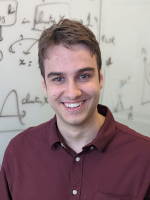
James Anibal
NIH Oxford Scholar
B.S. Computer Science, Case Western Reserve University, 2020
Dr. Bradford Wood (NCI) and
Prof. David Clifton (Oxford)
Precision medicine, Deep learning, Signal Processing
James Anibal attended Case Western Reserve University (CWRU) from 2016-2020, earning a B.S. in Computer Science. After his second year at CWRU, James began his research career at the National Cancer Institute under the mentorship of Dr. Grégoire Altan-Bonnet. His projects involved (I) developing machine learning algorithms for single-cell data analysis and (II) developing natural language processing (NLP) methods for biomedical text mining. From this research, James has published in Science and Journal of Clinical Investigation. He has also published a biomedical question-answering system on the Hugging Face NLP platform. In summer 2021, James worked as a research scientist at Afiniti, a multinational company aiming to improve business outcomes through AI-driven pairing of staff and customers. For his graduate studies, James is interested in scalable AI methods for noisy health data from devices such as wearable sensors and smartphones, working with partners around the world to develop novel digital health systems. Upon graduation from Oxford, James plans to continue building AI models for personalized medicine.

Jasmine Mack
NIH Cambridge Scholar
B.S. Biology, Psychology, Linguistics, Emory University, 2014
MPH Maternal and Child Health, Boston University, 2016
MS Biostatistics, University of Michigan, 2021
Dr. Alison Motsinger-Reif (NIEHS) and
Prof. Gordon Smith (Cambridge)
Statistical genetics & genomics, Genetic & environmental epidemiology, Biostatistics & computational Biology
Jasmine graduated from Emory University with a B.S. in Biology and Psychology/Linguistics. As an undergraduate, she worked at the Clinical Virology Research Laboratory under the supervision of Dr. Colleen Kraft, learning the microbiological and immunological components of clinical and public health research.
Inspired by her lab experience, Jasmine attended Boston University to pursue a Master of Public Health in Maternal and Child Health and Biostatistics, where she developed a passion for integrating public health and statistics. During this time, she was a Maternal and Child Health Research Fellow working with Dr. Emily Rothman as an interventionist for adolescent dating violence perpetrators in the pediatric emergency department at Boston Medical Center. Jasmine also interned at the Massachusetts Department of Public Health performing the analytics of perinatal periods of risk for feto-infant mortality under the leadership of Dr. Hafsatou Diop.
After graduating with a degree in public health, Jasmine worked as a research statistician at the University of Florida Department of Epidemiology under Dr. Linda Cottler. She had the opportunity to lead a data team and mentor students, focusing on community engagement research needs in Florida. She transitioned to the Department of Health Outcomes and Biomedical Informatics where she supported data analytics for pediatrics research under Dr. Matthew Gurka. A number of publications were produced during this time.
Jasmine’s interests further developed in perinatal epidemiology and statistical genetics. She was selected as a NHGRI T32 predoctoral fellow at the University of Michigan, gaining a Master of Science in Biostatistics. As a fellow, she focused on genome-wide association studies (GWAS) of preterm birth and preeclampsia with Dr. Bhramar Mukherjee. Due to the COVID-19 pandemic, research shifted to racial and ethnic disparities related to COVID-19 illness severity. She also explored methods of trans-ethnic GWAS of cardiometabolic traits in UK Biobank with Dr. Jean Morrison to increase ancestrally diverse participants represented in genetic studies. Following graduation, Jasmine was selected for an internship with Janssen/Johnson & Johnson focusing on modeling COVID-19 exposure during pregnancy.
Jasmine’s varied experiences in academia and industry as a biostatistician have fueled her desire to pursue a PhD to address health inequity. As an NIH Cambridge Scholar, her PhD research will delve into methods development in statistical genetics with focus on gene-environment interactions. Her work will be applied in maternal health research, exploring genetic and environmental contributions to adverse pregnancy outcomes across diverse populations.
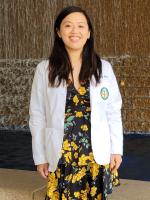
Jenny Hsin
NIH Cambridge Scholar MD/PhD
B.S., California Institute of Technology, 2018
M.D., University of Alabama at Birmingham Heersink School of Medicine (In progress)
Dr. Laura Kerosuo (NIDCR) and Prof. Shery Huang (Cambridge)
Stem Cell Biology, Developmental Biology, Cancer Biology
Jenny first entered the world of scientific research as a freshman at Caltech in 2014. She joined the lab of Professor Marianne Bronner, where she learned the importance of the neural crest, a unique population of stem cells in developing vertebrate embryos. She continued to work in the Bronner lab throughout the rest of her undergraduate career, researching oncogenes involved in the initiation of neuroblastoma, a neural crest-derived cancer. During the summer of 2017, Jenny traveled to Reykjavik, Iceland through a summer exchange program between Caltech and the University of Iceland. She worked in the lab of Dr. Gudrun Valdimarsdottir, studying the role of TGF-beta signaling in breast cancer cells. Her work in Iceland not only expanded her research interests but also sparked a desire to study abroad which would eventually lead her to find the NIH OxCam program.
After graduating from Caltech in 2018 with a BS in Biology, Jenny joined the lab of Dr. Laura Kerosuo in the National Institute of Dental and Craniofacial Research (NIDCR) at the NIH, where she focused on studying the stem cell properties of the neural crest as a post-baccalaureate research fellow. While at the NIH, Jenny made the decision to take the long path of becoming a physician-scientist so that she could combine her lifelong desire to become a physician with her ever growing passion for science. Subsequently, she matriculated to the UAB Heersink School of Medicine in 2020 through the UAB Medical Scientist Training Program and has since completed 2 years of medical training.
Currently, Jenny has returned to studying the neural crest and neuroblastoma. She is working to identify novel genes that initiate aggressive neuroblastoma and create neuroblastoma models using human embryonic stem cell-derived neural crest cells. Ultimately, she hopes to set up 3D tumor models where the in vitro environment mimics the biological microenvironment to better understand ways in which neuroblastoma can be treated.
Jessica Johnson
NIH Oxford Scholar
B.A. in Astrogeophysics (Honors) and German, Colgate University, 2022
Dr. Sarah Sheppard (NICHD), Prof. Christopher MacMinn (Oxford), and Prof. Johannes Weickenmeier (Oxford)
Aerospace Medicine, Planetary Science, Fluid Mechanics, Vascular Malformations.
Jessica, an Antarctic Scientist, is keenly interested in aerospace medicine, the study of sustainable human health in weightlessness and extreme (polar) climates. She received her B.A. in Astrogeophysics with Honors and a minor in German from Colgate University in 2022.
At Colgate, her work centered on planetary hydrology and geomorphology in Antarctica and on Mars. She conducted research and co-authored multiple papers discussing the climatic significance of boulder banding across Martian glaciers in the Proceedings of the National Academy of Sciences, the remote sensing of desert playa hydropatterns in Remote Sensing, and organic matter accumulation and electrical conductivity in Antarctic water tracks. These findings have been critical in understanding contemporary climate change (i.e. sea-level rise, oceanic thermal expansion) and Martian paleoclimates. Her planetary science research culminated in a six-week polar expedition to the McMurdo Dry Valleys, Antarctica during the 2022-23 austral summer field season.
Prior to her DPhil, Jessica completed a two-year NIH Postbaccalaureate IRTA Fellowship, under the supervision of Dr. Dan Benjamini, in the Multiscale Imaging and Integrative Biophysics Unit at the National Institute on Aging. This resulted in a first author publication in Human Brain Mapping, detailing a novel, in vivo protocol that disentangles diffusion frequency‐dependence, tensor shape, and relaxation within tissue microstructure using multidimensional MRI (MD-MRI). The goal is to apply this work to age-related diseases, such as Alzheimer’s and related dementias.
Jessica has been honored with the Valentine Piotrow Prize in German Excellence, DAAD Rise Fellowship for scientific research in Erfurt, Germany, Delta Phi Alpha, Phi Beta Kappa Daniel H. Saracino Prize for Scholarship of Exceptional Merit, Physics and Astronomy Joseph C. Amato and Anthony F. Aveni Award for Student Research, NIH Intramural Research Training Award (IRTA), the National Science Foundation’s Graduate Research Fellowship, and the Antarctica Service Medal. Most recently, she was recognized as one of 100 Polar Women by the Women in Polar Science Network and featured on the Black Women in Science Podcast for her research at Colgate, in Antarctica, and at the NIH.
As an NIH-Oxford Scholar, Jessica is studying lymphatic fluid-structure interactions to improve precision medicine for patients with lymphatic anomalies. She is co-mentored by Professor Howard Stone (Princeton University).
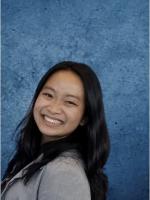
Jessica Tang
B.S., Yale University, 2020
M.D., University of California-Davis School of Medicine (In progress)
Dr. Irene Cortese (NINDS) and Prof. Colin Crump (Cambridge)
Neuroinflammation, Progressive multifocal leukoencephalopathy, Neuroscience
Jessica graduated from Yale University in May 2020 with a BS in Neuroscience with Distinction. During her undergraduate years, she worked in the Strittmatter Lab to study Fyn inhibition in a mouse model of Tauopathy. As a medical student at UC Davis, she was involved in the development of small Transcriptional Gene Silencing RNAs for the treatment of Fragile X Syndrome and Fragile-X-associated Tremor and Ataxia Syndrome under the co-mentorship of Dr. Paul Hagerman and Dr. Randi Hagerman. She took a year off after finishing her second year of medical school to become an Medical Research Scholars Program Fellow at the NIH under the co-mentorship of Dr. Daniel Reich and Dr. Irene Cortese where she studied the CNS uptake of an Anti-CD8 T cell PET tracer in patients with Multiple Sclerosis and Progressive Multifocal Leukoencephalopathy. In the NIH OxCam program, she will be co-mentored by Dr. Irene Cortese (NINDS) and Dr. Colin Crump (Cambridge).
Outside of the lab, Jessica enjoys playing tennis, swimming, and taking cap naps.

Jessica Phan
NIH Cambridge Scholar MD/PhD
B.A., Molecular Biology, Pomona College, 2019
M.D., Harvard Medical School (In progress)
Dr. James Bourne (NIMH), Dr. Joshua Gordon (NINDS),
and Prof. Angela Roberts (Cambridge)
Neuropsychiatric Disorders, Molecular Neuroscience, Neural Circuits
Jessica completed her undergraduate studies in Molecular Biology at Pomona College, where her research focused on exploring non-pharmacological approaches to treating attention-deficit/hyperactivity disorder (ADHD). Following graduation, she was awarded a Fulbright scholarship to conduct research on addiction and public policy in Portugal. Additionally, Jessica investigated primary immunodeficiencies at the National Institute of Allergy and Infectious Diseases (NIAID). In the Harvard/MIT MD-PhD program, Jessica investigated the neuroimmunological underpinnings of neuropsychiatric diseases. Currently, as part of the NIH OxCam program, Jessica's research delves into the role of the prefrontal cortex in decision making. Her ultimate aim is to develop targeted pharmacological therapies that address the cognitive deficits associated with neuropsychiatric disorders.
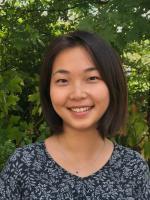
Jiali Zhang
NIH Oxford Scholar
B.S. Neuroscience, Johns Hopkins University
Dr. Kareem Zaghloul (NINDS)
and Prof. Tim Behrens (Oxford)
Cognitive neuroscience, Artificial intelligence, Functional neurology
Jiali graduated Phi Beta Kappa from Johns Hopkins University in December 2019. Her interest in Computational Cognitive Neuroscience took shape over several diverse research experiences throughout her undergraduate career.
While participating in a rigorous biochemistry program at the University of Oxford her sophomore year, what began as a final project evolved into a cross-continental study of diabetes, stroke, and the development of dementia under the supervision Dr. Gina Hadley. This work cumulated in a couple of systematic reviews and prompted her long-term interest in applying research to functional neurological diseases. While at Oxford, Jiali was an executive board member of the Oxford AI Society, where she discovered her interest in the intersection of artificial and natural intelligence. Upon returning to Hopkins, she founded and chaired the Johns Hopkins AI Society, generating interdisciplinary discussion regarding AI applications in research, healthcare, and other industries among students and faculty. As a junior, she explored the use of AI in stroke research at the Brain Behavior Learning and Animation Lab, where she built a powerful computer to implement a deep learning algorithm that accurately tracks hand joint positions to study post-stroke rehabilitation. That following summer, she interned in Dr. Chris Baker’s Lab at the NIMH, where she studied human visual perception using artificial neural networks. This project earned the Provost’s Undergraduate Research Award, allowing her to continue it throughout her senior year at Hopkins.
As an NIH-Oxford Scholar, Jiali aims to use computational modeling and a combination of intracranial and neuroimaging brain data to explore how humans harness sparse information and previous experiences to efficiently navigate new environments. She plans to attend medical school after completing her D.Phil. to combine her research with clinical practice as a physician-scientist. She hopes to conduct research that will further our understanding of natural intelligence and improve AI technology, while pushing the frontier of AI in medicine in translating her research to better diagnose and treat functional neurological disorders.
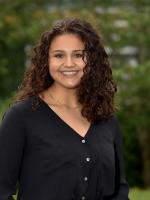
Jillian Riveros
NIH Cambridge Scholar
B.A., Wheaton College, 2022
Dr. Elizabeth (Tish) Murphy (NHLBI)
and Prof. Mike Murphy (Cambridge)
Mitochondrial Biology, Ischemia Reperfusion Injury, Cardiac Physiology
Jillian Riveros attended Wheaton College through the Posse Foundation Scholarship. During her time there, Jillian studied synthetic organic chemistry in Professor Chris Kalberg’s Lab where she worked to incorporate green chemistry approaches to the synthesis of substituted phenylalanine amino acids. Through this research, she was awarded the Barry Goldwater Scholarship. Outside of the lab, Jillian worked towards inclusive STEM programs at Wheaton College which included co-founding a living space on campus for underrepresented students earning STEM degrees called the Ohm Initiative.
In addition to Wheaton College, Jillian spent two summers at Vanderbilt University during her undergraduate degree. There she researched biomedical informatics in Dr. Yaa Kumah-Crystal’s Lab where she studied how artificial intelligence voice models can improve digital health platforms. She also researched cardiovascular metabolism in Dr. David Wasserman’s Lab where she investigated how exercise training influenced vasodilation.
After graduating summa cum laude from Wheaton College with a B.A. in Biochemistry, Jillian became a research assistant in Dr. Gökhan Hotamışlıgil’s Lab at Harvard T.H. Chan School of Public Health. During her two years in the Hotamışlıgil Lab, she participated in 5 different projects centered around obesity, diabetes, atherosclerosis, lipolysis, and mitochondrial metabolism.
These experiences expanded Jillian’s interest in mitochondrial and cardiovascular metabolism. Her goal through the NIH Oxford-Cambridge Scholars Program is to better characterize how reactive oxygen species and calcium contribute to cardiac ischemia-reperfusion injury. Through the collaboration between Dr. Elizabeth Murphy and Dr. Mike Murphy, she will apply both optical and mass spectrometry-based approaches to key genetic models available at the NIH and Cambridge to study ischemia-reperfusion injury in hopes of potentially advancing the development of therapeutics.

Jocelyne Rivera
NIH Oxford Scholar
B.S. Biomedical Engineering, University of Arizona, 2021
Dr. Bradford Wood (NCI) and
Prof. Eleanor Stride (Oxford)
Immunotherapy, Targeted delivery systems, Translational cancer research
Jocelyne Rivera was born and raised in Hermosillo, Sonora, Mexico. Jocelyne’s concern in global health disparities arose from my experience at age 17, when representatives of her high school in Mexico encouraged her to assist American physicians who were providing free medical services in a small municipality near her hometown. Assisting these doctors as an English/Spanish translator in a small town was an indelible experience that opened her eyes to the unmet medical needs of the Third World.
In 2016, she came to the United States to pursue college education. She started her journey at Pima Community College (PCC) and then transferred to the University of Arizona (UA) to major in Biomedical Engineering (BME). During her sophomore year at UA, she joined the BME laboratory of Dr. Philipp Gutruf to develop a wearable flexible biosensor that monitors the patient’s blood pressure and glucose levels, allowing for clinical decision-making at home, and thus reducing frequency of clinic visits. Jocelyne applied for and was selected as a trainee in Maximizing Access to Research Careers (MARC), a prestigious undergraduate research training program for underrepresented students funded by NIH. As a MARC trainee, she chose to work in the Biomaterials laboratory of Dr. Minkyu Kim. Jocelyne’s work in Dr. Kim’s lab involved the innovation of drug delivery systems that can be translated into the clinic to target and treat cardiovascular disease. Though she was accepted to a National Science Foundation (NSF) Research Experience for Undergraduates (REU) program at Johns Hopkins University for the summer of 2020, the pandemic made it impossible for her to gain in-person research experience. Fortunately, Jocelyne was able to apply for and was awarded a position in the Multi-Scale Systems Bioengineering “virtual” NSF REU program at the University of Virginia. To investigate the impact of network defects present in hydrogels, she innovated an agent-based model that measures mechanical properties of hydrogels based on crosslinking efficiency and rate of polymer network formation using an agent-based modeling software. Although the summer research program at UVA was completed, she initiated an interdisciplinary collaborative project between the laboratories of Drs. Kim and Peirce-Cottler.
Jocelyne graduated Summa Cum Laude from University of Arizona BS in Biomedical Engineering in May 2021. As an NIH-Oxford Scholar, Jocelyne intends to accelerate the development of accessible diagnostics, treatments, and cures for the most devastating diseases facing humanity.

Joey Toker
NIH Cambridge Scholar MD/PhD
A.B., Harvard University, 2021
M.Phil., University of Cambridge, 2022
M.D., Harvard-MIT Program in Health Sciences & Technology (In progress)
Dr. Javed Khan (NCI) and
Prof. Richard Gilbertson (Cambridge)
Immune microenvironment, Cancer origins and genomics, Metastasis
Joey graduated from Harvard College in 2021 with an A.B. in Integrative Biology and secondary in Chemistry. During his undergraduate thesis research, he investigated mechanisms of response to cancer immunotherapy, including the role of the gut microbiome in metastatic melanoma under Dr. Jen Wargo at MD Anderson. He additionally explored long non-coding RNAs associated with immunotherapy response in melanoma and glioblastoma under Dr. Marco Mineo and Dr. Nino Chiocca at Brigham and Women’s Hospital, work that he continued as a medical student at Harvard, where he matriculated in 2022. Between college and medical school, Joey was awarded a Herchel Smith Fellowship in Science to pursue an MPhil in Prof. Richard Gilbertson’s lab at the University of Cambridge, where he studied the immune microenvironment of medulloblastoma.
A Bethesda native, Joey graduated from St. Albans School in Washington, DC. His passion for biomedical research blossomed as a high school student, when he had the opportunity to study the genetics of erythrocyte homeostasis in Dr. Dave Bodine’s lab at the NIH.
As a PhD student, Joey will work under the supervision of Dr. Javed Khan and Prof. Richard Gilbertson. He is interested in understanding the immune microenvironments of malignancies—including rhabdomyosarcoma, neuroblastoma, and brain tumors—and their corresponding normal developing tissues. Aspiring to identify novel immunotherapeutic approaches for cancer, Joey plans to utilize single cell sequencing, spatial transcriptomics, and animal models to characterize the behavior of the immune system across these various biological contexts.
John Hancock
NIH Cambridge Scholar MD/PhD
B.S., Brigham Young University, 2015
M.D., University of Utah Medical School (In progress)
Dr. Mark Gilbert (NCI) and
Prof. Richard Mair (Cambridge)
Brain tumors, Translational immunology, Neuroscience
John’s interest in biomedical research started in a high school biology class. The idea that complex processes such as DNA replication could be happening in cells that were invisible to the naked eye captivated his attention. This excitement continued to build while completing a degree in physiology and developmental biology in college and working in the immunology lab of Scott Weber, PhD at Brigham Young University. After graduating with honors, John spent a year and a half in the same lab working as a research staff and lab technician studying T cell receptor biology and T cell metabolism. His projects included using molecular biology to engineer high-affinity T cell receptors, flow cytometry to construct T cell chimeric antigen receptors, and the Seahorse bioenergetics machine to analyze the effect of metabolic protein knockouts on the mouse immune system. These efforts led to a publication in Frontiers in Immunology. Each of these projects had application within the field of cancer immunology and inspired continued study of the interactions between solid tumors and immune cells.
He then matriculated into medical school at the University of Utah with the desire to develop a more global picture of medicine and disease. After completing three years of medical school, he refined his clinical interest to neurosurgery, in part because of the wealth of research that has yet to be accomplished within the field of neuroscience. During this time, he also helped Norman Taylor, MD, PhD, transition his lab from Harvard University to his new facility at the University of Utah Department of Anesthesiology. The experience gave unique insight into building a new lab. The Taylor group focused on using optogenetics to study pain pathways in the brain, which solidified John’s path towards the neurological sciences.
In 2020 John was accepted into the NIH Medical Research Scholars Program and joined the lab of Mark Gilbert, MD at the National Cancer Institute. Considering his previous experiences with cancer immunology and interest in the neurosciences, the Gilbert lab’s translational immunology work developing immunotherapy approaches for glioblastoma was an excellent fit. What engaged John throughout his time at the NIH was the challenge of glioblastoma and he published a review on the subject in Frontiers in Oncology.
Moving forward, John’s goal is to become a surgeon-scientist as an academic neurosurgeon. He chose to work with Richard Mair, MD, PhD who is a brain tumor neurosurgeon at the University of Cambridge. His PhD project will study the interactions between glioblastoma, immune cells, and neurons to enhance understanding of the pathophysiology of the disease and identify novel treatments for brain tumor patients.
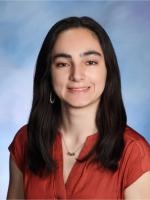
Josephine Watkins
NIH Oxford Scholar
B.S., Columbia University, 2025
Dr. Yosuke Mukoyama (NHLBI)
and Prof. Christopher Toepfer (Oxford)
Vascular Biology, Cardiac Disease, Organoids
Josephine graduated from Columbia University magna cum laude in May 2025 with a BS in Biomedical Engineering. She spent her undergraduate career under the mentorship of Dr Gordana Vunjak-Novakovic discovering her passion for cardiovascular research. This took the form of projects elucidating the E3 ligase of TGFBR2 in cardiac fibroblasts, a master regulator of fibrosis. She also contributed to projects that leveraged matured engineered heart tissues to better model and examine genetic cardiomyopathies. Additionally, Josephine spent time working for CorInnova, a biotech startup developing a non-blood contacting cardiac assist device. In this role, she focused on the design and risk assessment of an inter-operative cardiac sizing tool.
As an NIH OxCam Scholar, Josephine works under the guidance of Yosuke Mukoyama (NHLBI) and Christopher Toepfer (Oxford). Her project aims to develop complex cardiac organoids containing sympathetic neurons and vascular cells for the purpose of better understanding cardiac disease phenotypes and development. Afterwards, she looks forward to continue to engage in translational research to inform and improve cardiovascular health.
Outside of the lab Josephine enjoys playing sports such as fencing and pickleball and exploring cities’ hidden gems.
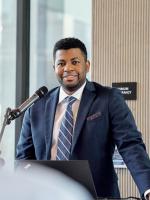
Jude Tunyi
NIH Oxford Scholar MD/PhD
B.S., Biochemistry, University of Washington, 2017
M.D., The Ohio State College of Medicine (In progress)
Dr. Lucy Forrest (NINDS) and
Prof. Simon Newstead (Oxford)
Neuropsychology, Reinforcement Learning, Learning and Decision Making
Jude attended the University of Washington to obtain a B.S. in biochemistry. He first undertook research after his freshman year when he was part of a study to develop in vivo treatments to bacterial biofilms on implanted surgical equipment.
He continued his undergraduate research career in Dr. Jim Pfaendtner’s lab in the NIH NIDDK STEP-UP program. He was using molecular dynamics and simulations to build computational models which can lead to longer-lasting insulin. During undergrad, he also spent a summer doing research in the Center for Aerosols Impact on Climate and the Environment (CAICE) program. He worked with Dr. Francesco Paesani on studying the effect that aerosols have on the climate by making molecular models using the ion-Thole-type (iTTM) model and quantum mechanical simulations.
After graduating in 2017 with Honors in Research, he sought out more research at the NIH so he became an NHLBI IRTA fellow working in the labs of Dr. Richard Pastor and Dr. Alan Remaley. In a mix of computational and bench side studies, he researched high density lipoproteins and APOA1 protein mimetics in hopes of building proteins that increase cholesterol efflux and decrease atherosclerotic effects in blood vessels. He took a gap year to pursue a master’s degree in biotechnology specializing in bioinformatics as part of the Fulbright Program at Tampere University in Finland. He continued his involvement in the Fulbright program by becoming a Fulbright Alumni Ambassador. His work at the NIH opened his eyes to the physician-scientist career and he began his MD/PhD studies at The Ohio State College of Medicine.
As an NIH-Oxford student, Jude is planning on studying chaperone proteins which influence intracellular protein localization and activity and how it leads to neurological disorders and cancer. He plans on using biochemical techniques, cryo-electron microscopy, computational simulations and artificial intelligence models. After completing his graduate and medical schooling, he will pursue further clinical training in residency with hopes of helping to improve human health and medicine through research.
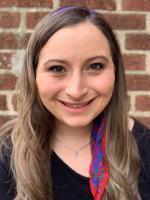
Kelsey Lowman
NIH Cambridge Scholar
B.S. Microbiology, University of Alabama, 2017
M.S. Biology, University of Alabama, 2018
Dr. Leah Katzelnick (NIAID) and
Prof. Jonathan Heeney (Cambridge)
Viral immunology, Cell biology, Emerging infectious diseases
Kelsey is originally from the metro-Atlanta area, where the presence of the CDC acted as a constant, peripheral reminder for the importance of disease research throughout her childhood. For her undergraduate education, she attended the University of Alabama (UA). Hoping to better understand disease research, she joined Dr. Laura Reed’s population genetics lab during her freshman year. The lab’s research focused on the genetic and environmental interactions that underlie metabolic diseases, and her early work there centered around the interactions that exist between diet and genotype. By the end of her sophomore year, she knew she wanted to pursue disease research for her career. In pursuit of that, she joined UA’s Accelerated Master’s Program and began her thesis research. Over the next 2.5 years, Kelsey worked to complete her undergraduate degree alongside her thesis research project to graduate from the University of Alabama with her B.S in Microbiology and her M.S. in Biology. Her thesis work focused on establishing a method and protocol for exercising fruit flies in the lab, which enabled her to study how exercise, diet, sex, and genotype interact together to influence the variation in metabolic disease states seen across populations. Towards the end of her master’s, Kelsey realized that while she loved disease research, the diseases she was most passionate about were infectious ones.
After graduation, Kelsey started a position as a Research Assistant in Dr. Olaf Kutsch’s lab at the University of Alabama at Birmingham (UAB) with the goal of transitioning into infectious disease research. The main research focus of the lab was to uncover molecular mechanisms of HIV-1 latency, but often work branched into a variety of other topics. Kelsey’s primary work centered around exploring the role of the tetraspanin CD151 in cancer and T-cell biology, but she was also actively involved in research concerning HIV reactivation and SARS-CoV-2 infection. Her work at UAB introduced her to a variety of immune diseases and pathogens, which solidified her choice to pursue infection disease research. This led her join the NIH OxCam Program for her PhD training. As an NIH-Cambridge scholar, under the co-mentorship of Dr. Leah Katzelnick (NIAID) at the NIH and Dr. Jonathan Heeney in the Department of Veterinary Medicine at Cambridge, Kelsey will explore the importance of re-exposure in maintaining enduring, protective immunity to dengue infection. Upon graduation, Kelsey hopes to continue to pursue a career in viral immunology research and one day establish her own lab researching the interplay between viruses and host immunity.
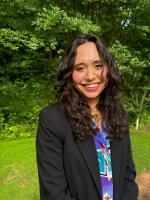
Keyshla Negron Rios
NIH Cambridge Scholar
B.A., University of Michigan, 2020
Dr. Carlos Guardia (NIEHS). Prof. Laura Dearden (Cambridge)
and Prof. Susan Ozanne (Cambridge)
Placenta brain axis, Autophagy, and Maternal obesity
Keyshla did her undergraduate studies at the University of Michigan where she researched neurodegeneration studying protein homeostasis in the aging brain. She later did a PREP program at the University of Alabama, Birmingham, where she continued to research neurodegenerative diseases. For her graduate studies she researched Glaucoma and potential treatments.

Kritika Singh
NIH Rhodes Scholar
B.S. Bioengineering,
Northeastern University, 2020
Dr. John Schiller (NCI), Prof. Eleanor Stride (Oxford),
Prof. Udo Oppermann (Oxford), and Dr. Ralph Mazitschek (Harvard)
Chemical biology, Bioengineering, Immuno-oncology
Kritika’s passion for biomedical research started in high school during an internship at Acetylon Pharmaceuticals where she worked on epigenetics and malaria. This drove Kritika to pursue additional research experiences at the Wirth Lab at Harvard TH Chan School of Public Health and the Long Lab at the NIAID. Her research experiences in high school also inspired her to found a non-profit, Malaria Free World, which engages in national and international peer-to-peer education on infectious diseases.
In 2020, Kritika graduated summa cum laude from Northeastern University BS in Bioengineering and a minor in chemistry. She attended Northeastern as a University Scholar, member of the Honors Department, and a Presidential Scholar. She furthered her passional for translational research and spent 4 years in the lab of Ralph Mazitschek at Massachusetts General Hospital working on malaria, epigenetics, and platform development. Throughout undergrad, she also developed her passion for connecting the bench and the bedside by shadowing physician-scientist, Dr. Ken Anderson at the Dana Farber Cancer Institute. At Northeastern, she founded the Northeastern University Global Health Initiative (NUGHI) which organizes and develops novel content for an annual, international and interdisciplinary student-led global health conference while connecting students, faculty, and experts.
A recipient of the Rhodes, Truman, and Goldwater Scholarships, Kritika understands that science alone will not eradicate disease. She aims to integrate biomedical research, clinical practice, and global health policy in her career and is excited to pursue her PhD at the intersection of bioengineering, chemical biology, and immuno-oncology. Her goal is to develop technologies and therapies that can be widely adapted in high- and low-resource settings.
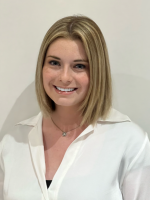
Kyli McKee
NIH Oxford Scholar MD/PhD
B.S., Biology, American University, 2020
M.P.S., Data Science, University of Maryland, Baltimore County, 2022
M.D., University of Maryland School of Medicine (In progress)
Dr. John Shern (NCI) and
Prof. Adam Cribbs (Oxford)
Translational Genomics, Cancer Biology, Computational Biology
Kyli graduated with honors from American University’s Honors in Biology Program in 2020, earning a Bachelor of Science in Biology with a minor in Public Health. It was during her undergraduate studies that she began to envision a future in medicine that would be incomplete without deeper training in scientific research. Under the mentorship of Dr. John Bracht, Kyli led a bench-to-bedside research project aimed at identifying methylation-modulating drugs as potential therapeutics for colorectal carcinoma. She partnered with the National Center for Advancing Translational Sciences to screen previously FDA-approved compounds for their demethylating potential in colorectal cancer. Her contributions earned her three competitive research grants: two Gloria A. Likins Endowed Scholarships and one NASA/CAS Mathias AU STEM Student Summer Research Award.
To further immerse herself in translational research before pursuing graduate education, Kyli accepted a two-year postbaccalaureate position at the National Institutes of Health. In Dr. Forbes Porter’s laboratory at NICHD, she studied cholesterol homeostasis and lysosomal storage disorders, including Niemann-Pick disease type C (NPC), Smith-Lemli-Opitz Syndrome (SLOS), and Juvenile Batten disease (CLN3). Her primary project involved collaborating on the development of a machine learning algorithm to identify potential genetic modifiers in the NPC community. This work revealed how vital computational tools and bioinformatics have become in advancing medical science. Recognizing the need for expertise at the intersection of biology and data science, Kyli concurrently pursued a Master of Professional Studies in Data Science at the University of Maryland, Baltimore County. Guided by her NIH mentor Dr. Christopher Wassif, she honed her skills as an independent researcher and critical thinker. Each day in the lab further affirmed her aspiration to combine medicine and research as a physician-scientist.
Kyli matriculated into the Medical Scientist Training Program at the University of Maryland School of Medicine to begin her medical training, always with the intention of returning to the NIH. Now, through the NIH Oxford-Cambridge Scholars Program, she is excited to conduct her DPhil research under the joint mentorship of Dr. John Shern (NCI) and Professor Adam Cribbs (Oxford). Her project aims to integrate wet-lab experimentation with computational approaches to expand the functional proteome of rhabdomyosarcoma and identify novel regulators of tumor behavior.
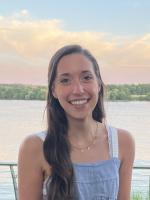
Lauren McCormick
NIH Oxford Scholar
B.S., University of North Carolina at Chapel Hill, 2021
Dr. Patrick Dolan (NIAID) and
Prof. Aris Katzourakis (Oxford)
Viral Evolution, Pathogen dynamics, Phylogenetics
Lauren graduated with honors and highest distinction from the University of North Carolina (UNC) at Chapel Hill in 2021 with a B.S. in Biology and minors in Medical Anthropology and Statistics & Analytics. During her first year at UNC-Chapel Hill, Lauren joined the Infectious Disease Epidemiology & Ecology Lab (IDEEL) at the UNC Institute of Global Health and Infectious Diseases, where she was mentored by Dr. Steven Meshnick, Dr. Jonathan Parr, and Dr. Jonathan Juliano. Over the course of her time with IDEEL, Lauren worked on several studies aimed at understanding the molecular epidemiology of malaria in Sub-Saharan Africa. Her work culminated in an honors thesis investigating the prevalence of anti-malarial drug resistance in Dschang, Cameroon.
After graduating, Lauren joined the Human Immunology Section of the Vaccine Research Center (VRC/NIAID/NIH) as a post-baccalaureate fellow under Dr. Daniel Douek. While at the VRC, Lauren worked on a variety of timely projects aimed at understanding the immune response generated by SARS-CoV-2 vaccines in humans and non-human primates. Her team was particularly interested in evaluating the B cell response to heterologous antigen exposures given the continued emergence of SARS-CoV-2 variants. In addition to COVID-19 research, she also worked to implement phage immunoprecipitation sequencing (PhIP-seq)— a high-throughput method for detecting antigen reactivity in human sera—at the VRC.
As an NIH Oxford-Cambridge Scholar, Lauren is hoping to combine phylogenetic inference techniques and phylodynamic modeling with laboratory experiments to advance our understanding of how viruses evolve. She is particularly interested in interrogating the factors that influence and constrain the evolution of enterovirus capsid proteins.
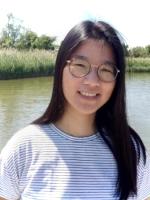
Linh Pham
B.S., Cell and Molecular Biology, 2018
M.D., University of Texas Health Science Center San Antonio (In progress)
Dr. Armin Raznahan (NIMH)
and Prof. Jason Lerch (Oxford)
Comparative neuroscience, Brain development, Neuroimaging
As someone who constantly has lots of questions about the way the things work, I have been involved in research with different types of organism systems (plants, fruit flies, yeast, human) since my undergraduate years. These research opportunities have taken me from my college, Humboldt State, to Michigan State, Johns Hopkins, and the NIH (NICHD and NIAID). Doing research at a variety of institutions instilled in me a need to perpetually be challenged by new ideas, new environments, and to synthesize my understanding in ways that can make small improvements in the world. I joined the OxCam program and the UTHSCSA MSTP for this purpose. During my PhD training, I will be working between the laboratories of Dr. Armin Raznahan and Professor Jason Lerch. I am hopeful that the outcome of my PhD project can partially help close the translational gap between mouse models and human neuroscience.
Outside of the lab, you can likely find me hiking or rambunctiously singing karaoke. Often both at the same time when there is no one else on the trails. I also enjoy hosting dinner parties. If I remember correctly, I was told by friends that I am a good cook.
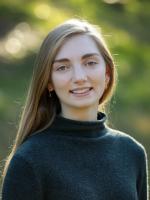
Lydia Good
NIH Cambridge Scholar
B.S., Georgetown University, 2021
MPhil, University of Cambridge, 2022
Dr. Robert Best (NIDDK)
and Prof. Tuomas Knowles (Cambridge)
Protein biophysics, Self-assembly, Computational biology
As an undergraduate at Georgetown University, Lydia studied biochemistry with a minor in mathematics, but she spent most of her time focused on protein biophysics as a member of Dr. Rodrigo Maillard’s research group. She developed statistics- and simulation-based data analysis tools for the Maillard Lab to use on data from single molecule optical tweezers experiments probing protein allostery. A summer internship with Dr. Amelie Stein through the Rosetta Commons solidified her interest in computational biophysics, and she returned the next year to work with Dr. Stein and Dr. Kresten Lindorff-Larsen at the University of Copenhagen on structure-based prediction methods for mutational effects on protein stability.
After graduating from Georgetown, Lydia spent a year as a research master’s student in Dr. Tuomas Knowles’ group at Cambridge, where she used data-driven computational approaches to characterize and predict biomolecular phase separation processes. She is looking forward to building on this work during her PhD and combining experimental and data-driven work in the Knowles group with molecular simulations in Dr. Robert Best’s group at NIDDK. Lydia hopes that by working across the molecular and cellular scales to achieve quantitative understanding of biomolecular systems, especially protein-protein interactions, she can help improve our understanding of molecular mechanisms in health and disease.
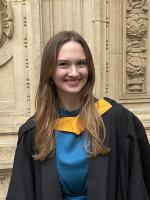
Madeleine Eaton
NIH Cambridge Scholar
B.Sc., Imperial College London, 2023
M.Sc., University of Oxford, 2025
Dr. Sonja Best (NIAID) and
Prof. Yorgo Modis (Cambridge)
Structural Biology, Innate Immunity, Virus-Host Interactions
Madeleine earned her bachelor’s degree in biochemistry from Imperial College London in 2023. As an undergraduate, she conducted research in Professor David Mann’s lab, where she helped optimize a novel covalent fragment identification assay, quantitative irreversible tethering. Her work focused on identifying drug fragment hits against KDM5a, an underexplored cancer target protein, to inform future drug discovery efforts against traditionally ‘undruggable’ target proteins.
She went on to pursue a master’s degree at the University of Oxford, working jointly between Professors Jason Schnell & Lidia Vasilieva. There, she used NMR spectroscopy to study the interactions between the conserved transcription elongation factor Spt5, nascent RNA, and transcription termination machinery. Her research revealed new interactions that shift the current understanding of transcription termination.
As a result, Madeleine also became interested in how this fundamental biological mechanism of transcription is hijacked during viral infection. As an NIH Cambridge scholar, she plans to integrate structural biology approaches in Professor Yorgo Modis’s lab at the MRC Laboratory of Molecular Biology in Cambridge with the functional virology work of Dr. Sonja Best at NIAID. Her research will focus on understanding how the dsRNA sensor MDA5 finetunes the immune response to distinguish between viral RNA and self-RNA to prevent autoimmunity. She ultimately hopes to contribute to an increased understanding of virus-host interactions as well as autoimmune conditions
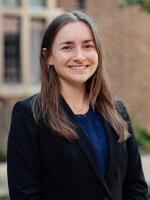
Madeline Garvey
B.S., Neuroscience, The College of William and Mary, 2018
M.D., Georgetown University School of Medicine (In progress)
Dr. Karen Berman (NIMH), Prof. Ed Bullmore (Cambridge)
and Prof. Petra Vertes (Cambridge)
Neuroimaging, neuropsychiatric genetics, neurodevelopmental disorders
Madeline is an MD/PhD student and hopes to ultimately contribute to the greater understanding of and personalized treatment for complex heterogeneous neuropsychiatric disorders such as autism and schizophrenia.
Growing up, Madeline worked extensively with children with neurodevelopmental disorders, including autism. She was impressed by their resilience in overcoming challenges and was fascinated by the ways in which they processed the world differently, especially social environments. This inspired her to pursue autism research while at the College of William and Mary, where she joined a neuroscience lab that studied autism under supervision of Drs. Cheryl Dickter and Joshua Burk. Here, she used EEG to investigate the spectrum of autistic traits in neurotypical individuals and learned how this could help scientists gain a greater understanding of the heterogeneity in people with autism.
Excited by the prospects of using neuroimaging to study in vivo brain phenotypes and behavior, after college Madeline joined the Clinical and Translational Neuroscience Branch at the National Institute of Mental Health under Dr. Karen Berman. Here, in addition to expanding her neuroimaging knowledge to include MRI, PET, and MEG, she also was first exposed to genetics research in a rare genetic, neurodevelopmental disorder called Williams syndrome.
Madeline became excited by the opportunity to study Williams syndrome and other rare genetic disorders that may contribute to our understanding of more common neuropsychiatric disorders. This inspired her to continue working with Dr. Berman as a PhD student. In collaboration with Drs. Ed Bullmore and Petra Vertes at The University of Cambridge, Madeline hopes to conduct multimodal neuroimaging, genetic, and computational research to investigate how genetics and neural development impact brain structure and function, ultimately contributing to disease etiology. She hopes to create new discoveries about the gene-brain-behavior link and how to better develop personalized treatments for individuals with neuropsychiatric disorders.
Outside of lab, Madeline enjoys running, painting, visiting museums, and traveling.
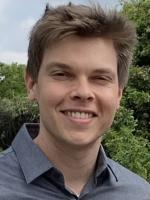
Marc Theberge
NIH Cambridge Scholar
B.S., Tulane University, 2021
Dr. Eli Boritz (NIAID-VRC) and
Prof. Nicholas Matheson (Cambridge)
Immunology, Virus Persistence, Chronic Illness
Raised in Louisiana, I attended Tulane University to play baseball and study Cell and Molecular Biology. After suffering a shoulder injury on the baseball field, I was afforded more time to work in research labs at the Tulane School of Medicine to complement my coursework. For my first research experience, supervised by Dr. Muthusamy Kunnimalaiyaan, I explored ways to overcome therapeutic resistance in advanced thyroid cancer. I then transitioned to a virology and immunology lab led by Drs. Dahlene Fusco and Arnaud Drouin to explore Zika virus-host interactions. During the COVID-19 pandemic, I became a research staff member for three of the lab’s clinical studies on COVID-19 that included an observational study and two therapeutic trials. Witnessing the importance of virology and immunology research during the pandemic inspired me to join NIAID as a post-baccalaureate fellow under Dr. Eli Boritz to learn more about how viruses could be studied. There, my research focused on method development to better understand how HIV infection persists in the presence of antiretroviral therapy.
As an NIH-Cambridge Scholar, I am continuing to study HIV persistence with the goal of identifying and describing host factors that regulate HIV latency. In the future, I hope to keep researching how some viruses, such as HIV and herpesviruses, persist indefinitely within their hosts, the relationship between virus persistence and chronic and delayed illnesses, and strategies to cure persistent infections.
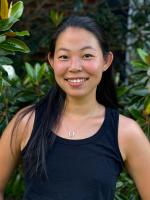
Mariah Lofgren
NIH Oxford Scholar
B.A., Sarah Lawrence College, 2021
Dr. Joshua Tan (NIAID)
and Prof. Matt Higgins (University of Oxford)
Malaria, Antibody discovery, and Structure biology
Mariah graduated from Sarah Lawrence College with a concentration in molecular biology. Initially entering undergrad as a pre-med, she joined a molecular biology lab studying the genetic regulation of a key immune system gene. She credits her undergraduate experience as the catalyst for finding her love for translational research and New York City.
After graduating, she worked full-time studying molecular metabolism before joining Dr. Robert Seder’s malaria unit as a postbaccalaureate research fellow at the NIH. There she found an interest in discovery, development, and evaluation of antibodies and vaccines against malaria.
In the NIH Oxford-Cambridge Scholars Program, Mariah works with Dr. Joshua Tan, Chief of the Antibody Biology Unit at the National Institute of Allergy and Infectious Disease, and Dr. Matt Higgins, Chair of Structural Biology at the University of Oxford. Through this collaboration, she looks forward to continuing her work in malaria, specifically discovering novel blood-stage malaria antibodies. Outside of research Mariah enjoys a good cup of coffee, sports, and good (gluten free) food.
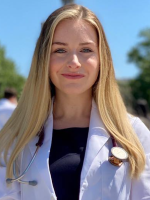
Marlene Lawston
NIH Oxford Scholar MD/PhD
B.A., Molecular Biology, Colgate University, 2020
M.D., University of Rochester School of Medicine (In progress)
Dr. Francis McMahon (NIMH)
and Prof. Francis Szele (Oxford)
Neurodevelopmental Disorders, Neurogenesis, Genetics
Marlene graduated summa cum laude from Colgate University with high honors in molecular biology and a minor in Chinese. During her time at Colgate, Marlene completed an honors thesis investigating sensory organ development and regeneration in blind cavefish (Astyanax mexicanus) – this project provided the basis for her successful Beckman Scholarship and Goldwater Scholarship. Outside of the lab, Marlene volunteered as an EMT and managed other students as a coordinator for the Southern Madison County Volunteer Ambulance Corps. Additionally, she worked as a head first responder for Colgate Recreation and tutored biology courses.
After graduating from Colgate University, Marlene began her MD/PhD studies at the University of Rochester School of Medicine and Dentistry. While she had always had an interest in molecular neurobiology from her prior research and coursework at Colgate, studying neuroscience and neuroanatomy during her first two years in medical school solidified neurology as her primary interest both clinically and from a research perspective. Specifically, Marlene took an interest in the mechanisms underlying neurodevelopmental disorders while shadowing in pediatric neurology and medical genetics.
Under the supervision of Dr. Francis McMahon at the NIMH and Professor Francis Szele at Oxford, she will use human iPSC and organoid models to better understand the genetics underlying developmental neuropsychiatric disorders.
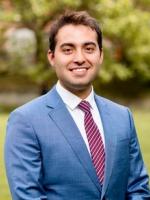
Mathieu Perez
NIH Cambridge Scholar MD/PhD
B.S.-M.S., Honors Chemistry and Physics,
City University of New York | The City College, 2020
M.D., University of California, San Francisco (In progress)
Dr. Michael Ward (NINDS), Prof. Omer Bayraktar (Cambridge),
and Prof. Andrew Bassett (Cambridge)
Physics, Chemistry, Neurodegenerative Diseases
During his undergraduate training, Mathieu specialized in studying the wound-healing structure and process of plants from the perspective of physical biochemistry. To gain insights into this field, he employed a range of analytical techniques, including NMR, EM, AFM, and GC/LC-MS. Fascinated by the interplay of chemistry, physics, and human biology, Mathieu decided to further explore the realm of protein structure and function. This led him to undertake an internship at Harvard Medical School, where he immersed himself in the disciplines of x-ray crystallography and cryo-EM. His primary focus was to investigate the structure and interactions of ubiquitin and ubiquitin-like proteins with DUBs.
Driven by an increasing interest in unraveling the fundamental principles of biology to elucidate human pathology, Mathieu subsequently joined the National Institute of Allergy and Infectious Diseases (NIAID). During his time there, he dedicated his efforts to unraveling the biomolecular processes underlying familial eosinophilia.
Mathieu's extensive and diverse research experience in chemistry and physics has endowed him with the versatility to tackle various research questions. Currently, he has embarked on a combined MD-PhD (MSTP) program at the University of California, San Francisco (UCSF), NINDS-NIH, and the Wellcome Sanger Institute, affiliated with the University of Cambridge. His studies revolve around investigating the underlying causes of specific cell vulnerability in neurodegeneration, blending his clinical and research interests.
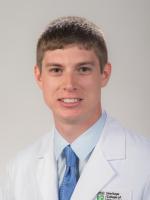
Matthew Berns
NIH Oxford Scholar
B.S. Biology & Geology, University of Cincinnati, 2015
D.O., Ohio University (In progress)
Dr. William J. Pavan (NHGRI),
Prof. Pedro Moura Alves (Oxford),
and Prof. Colin Goding (Oxford)
Genetics, Developmental biology, Cancer biology
Matthew is from Westerville, OH, and graduated from the University of Cincinnati in 2015. As an undergraduate he conducted research in the lab of Dr. Bruce Jayne. His research focused on the interaction of arboreal snakes with their environment, where it was shown that body shape and surface features (e.g. roughness and incline) have immense impact on modality and speed of locomotion across species.
After college, Matthew pursued further research in the lab of Dr. James Wells at Cincinnati Children’s Hospital Medical Center. He studied neural crest biology in the context of enteric nervous system formation of the murine and human foregut. He developed a passion for the neural crest, or so called “4th germ layer”, which is a remarkable embryonic cell type that gives rise to a vast array of terminally differentiated cells and tissues – including chondrocytes, bone, neurons, Schwann cells, chromaffin cells of the adrenal medulla, and melanocytes.
As a medical student at Ohio University, Matthew sought out further research experience through the NIH Medical Research Scholars Program. He joined the lab of Dr. William J. Pavan, with whom he will continue his doctoral studies along with Drs. Pedro Moura Alves and Colin Goding at Oxford. His work will focus on the factors regulating melanin production and how aberrations in these pathways can lead to and/or exacerbate the course of melanoma. Upon completion of his doctoral studies, Matthew plans to become a pediatric geneticist with a focus on rare disease medicine. He aims to model neurocristopathies with the goal of developing novel clinical treatment modalities.
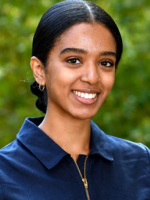
Meklit Daniel
B.A. (Hons), Anthropology and Public Health, Williams College, 2020
M.Phil., Health, Medicine, and Society, University of Cambridge, 2021
M.Phil., Population Health Sciences, University of Cambridge, 2022
Dr. Alexandra White (NIEHS), Prof. Hubert Lam (Oxford),
and Prof. Christiana Kartsonaki (Oxford)
Environmental epidemiology, Cancer epidemiology, Biomarkers, Geospatial analysis
Meklit Daniel graduated from Williams College with a B.A. (Hons) in anthropology and public health. With support from a Dr. Herchel Smith Fellowship, she then earned two M.Phil. degrees in medical anthropology and population health sciences respectively from the University of Cambridge. Afterwards, Meklit trained in epidemiology as a research fellow at the National Institute of Environmental Health Sciences (NIEHS). There, she worked on projects examining the association between residential proximity to toxic industrial sites and toenail metal concentrations and the impact of outdoor air pollution on breast cancer risk while accounting for residential mobility.
As a NIH OxCam Scholar, Meklit works with Dr. Alexandra White (NIEHS) and Profs. Hubert Lam and Christiana Kartsonaki (Oxford), investigating the role of outdoor air pollution as a potential risk factor for breast cancer among women in the U.S. and China. Ultimately, Meklit aims to utilize epidemiologic methods and geospatial analysis to better understand how environmental pollutants are related to cancer development.
In her free time, Meklit enjoys hiking, reading novels, testing recipes, and playing with her film and digital cameras.
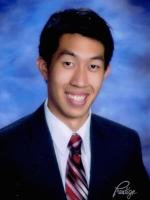
Mitchell Sun
NIH Oxford Scholar
B.S., University of Illinois at Chicago, 2019
M.D., Baylor College of Medicine (In progress)
Dr. Zhengping Zhuang (NCI) and
Prof. Michael Dustin (Oxford)
Immunotherapy, Immuno-oncology, Cancer therapeutics
In high school, Mitchell Sun attended the Illinois Mathematics and Science Academy where he was introduced to research in the laboratory of Dr. Yulia Komarova in the Department of Pharmacology at the University of Illinois at Chicago. Under Dr. Komarova, he studied how the role of the microtubule cytoskeleton in lung vascular permeability can provide therapeutic targets in treating inflammatory lung diseases. After graduating high school, he went on to study a B.S. in Biochemistry at the University of Illinois at Chicago in their guaranteed medicine program (GPPA), which allowed him the safety to pursue more of his interests adjacent to medicine. He continued research in Dr. Komarova’s laboratory where he expanded his project to studying the hypoxic mechanism of vascular permeability in pulmonary arterial hypertension and worked on developing a method of studying the protein interactome through a microsystem platform to pull down protein complexes.
Through the Summer Internship Program at the National institutes of Neurological Diseases and Stroke, he pursued a diverse array of research with Dr. Zhengping Zhuang during his college summers which included characterizing a novel hypoxia inducible factor mutant mouse model, developing a chimeric antigen receptor t-cell (CAR-T) targeting glioblastoma models, examining the role of fatty acid oxidation in macrophage phenotype and its impact on cancer migration in hepatocellular carcinoma, and developing a compound to downregulate chronic activation of the hypoxia pathway in disease states.
His experience with translational research pushed him to pursue an MD/PhD at Baylor College of Medicine. During his PhD, he aims to further develop an immunotherapeutic cancer vaccine in Dr. Zhengping Zhuang’s lab at the NCI and to investigate its immunological mechanisms with Professor Michael Dustin and Professor Charlotte Deane at the University of Oxford.
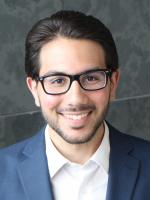
Mohammed Abuelem
NIH Oxford Scholar
B.A., Neuroscience, Harvard University, 2023
M.Sc., Physiology, Anatomy and Genetics, University of Oxford, 2024
Dr. David Leopold (NIMH), Prof. Zoltán Molnár (Oxford),
and Prof. Ed Mann (Oxford)
Neurodevelopment, Neurophysiology, Neuroplasticity
Mohammed graduated summa cum laude from Harvard University in 2023 with a B.A. in Neuroscience and a minor in Global Health and Health Policy. For his undergraduate thesis project in Prof. Takao Hensch’s lab, Mohammed investigated the developmental role of the Shank3 autism risk gene in reversible cognitive rigidity using a Shank3 conditional knock-in mouse model and presented a novel synaptic protein relationship that may underlie autistic-like cognitive rigidity. Mohammed received the Thomas Temple Hoopes Prize for his thesis project, along with the Mary Gordon Roberts Mind, Brain, & Behavior Research Fellowship. During his time at Harvard, Mohammed also conducted research in the Department of Neurosurgery at Brigham and Women’s Hospital and at the Institute for Health Metrics and Evaluation as a Harvard Global Health Institute Fellow and Mindich Service Fellow. Outside of lab, Mohammed enjoyed teaching neuroscience and chemistry as a teaching fellow, along with volunteering at Massachusetts General Hospital and the Harvard Square Homeless Shelter.
Mohammed’s undergraduate research inspired an interest in developmental plasticity and flexible reward learning, which motivated him to pursue an M.Sc. by Research degree in Physiology, Anatomy, and Genetics at the University of Oxford under the mentorship of Prof. Zoltán Molnár and Prof. Ed Mann. For his M.Sc. thesis project, Mohammed employed in-vitro electrophysiological techniques such as whole-cell patch clamp and multielectrode array recordings to study the dopaminergic modulation of deep-layer neuronal network activity in the murine medial prefrontal cortex and its role in gating cortical arousal and mediating anxiety behavior.
As an NIH OxCam Scholar, Mohammed seeks to combine in-vivo and in-vitro electrophysiological and anatomical techniques to better understand the interplay between synaptic molecular mechanisms and network activity involved in flexible reward learning during development under the mentorship of Dr. David Leopold at the NIMH and Prof. Zoltán Molnár and Prof. Ed Mann at Oxford. After his PhD, Mohammed plans to attend medical school with the long-term goal of becoming a physician-scientist and improving therapies that target altered cortical circuit dynamics.
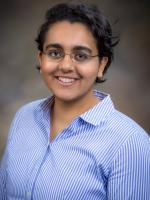
Neha Wali
NIH Oxford Scholar MD/PhD
B.S. Biochemistry and Molecular Biology, University of Maryland Baltimore County, 2018
M.D., Long School of Medicine, University of Texas Health San Antonio (In progress)
Dr. Curtis Harris (NCI)
and Prof. Xin Lu (Oxford)
Tumor immunology, Immunotherapy, Cancer genomics
After Neha graduated from high school and partook in initial scientific research, she pursued additional laboratory experiences as an undergraduate student at the University of Maryland, Baltimore County (UMBC). In research rotations at the National Cancer Institute, UMBC, and at the Johns Hopkins University, Neha engaged in a range of projects that examined tumor immunology and cancer genomics in the context of immunotherapy clinical efficacy, which further strengthened her passion for these fields. Neha realized that a dual-degree program would therefore be the best option to weld her strong interests in science and medicine. After she graduated summa cum laude from UMBC, Neha was selected in the South Texas Medical Scientist Training Program in San Antonio as an M.D./Ph.D. student. After she completed her second year of medical school, Neha was accepted into the OxCam program. In her graduate studies between the NCI and Oxford, Neha will now elucidate the implications of p53 isoforms on immune cells and immunotherapy in esophageal cancer.

Nelanne Bolima
NIH Cambridge Scholar
B.S., Chemical Engineering, University of Maryland-Baltimore County, 2024
Dr. John Tisdale (NHLBI) and
Prof. Marc de la Roche (Cambridge)
Gene Therapy, Sickle Cell Disease, Immunotherapy
Nelanne Bolima, a Cameroonian-American from Burtonsville, MD, earned her medical assistant license in high school where she discovered her passion for biomedical science through internships at Georgetown University. Motivated by her family's experiences with sickle cell anemia (SCA), she studied chemical engineering with a bioengineering focus at UMBC.
She conducted research on biodegradable mycelium-based plastics in Dr. Mark Marten’s lab and participated in a Purdue CISTAR REM program exploring CO₂ conversion into hydrofuels. Hope to seek better alignment with her gene therapy interests, she joined Duke’s PRIME PREP program, where she worked on CRISPR-dCas12-mediated gene expression for genome normalization in aneuploidy cells. Her PhD will focus on various delivery systems for gene and immunotherapies, aiming to advance treatments for genetic diseases.
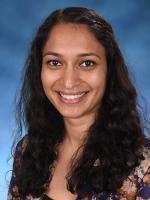
Nisita Dutta
NIH Gates Cambridge Scholar
B.S., Johns Hopkins University, 2019
M.S.E, Johns Hopkins University, 2020
M.D., University of Maryland School of Medicine (In progress)
Dr. Christine Alewine (NCI) and
Prof. Gonçalo Bernardes (Cambridge)
Drug delivery, Oncology, Biomedical engineering
Nisita grew up in central New Jersey and discovered a love for scientific research during her undergraduate years at Johns Hopkins University (JHU). After becoming an Operations Coordinator for Camp Kesem at JHU, a camp for children whose parents suffer from cancer, she decided to combine her interests in medicine and engineering to help alleviate the burden of disease for patients.
Nisita researched in the lab of Dr. Rebecca Schulman for three years during her undergraduate years where she worked with DNA nanotechnology systems. Her work eventually led to a publication in the Journal of the American Chemical Society which highlighted a DNA stand buffer system that could keep a target stand of DNA constant in chemically noisy environments. After this introduction to scientific research, Nisita went on to continue her training through the Biomedical Engineering Summer Internship Program at the National Institutes of Health (NIH). Here she worked in the Clinical Center under Dr. Bradford Wood where she created a flow-through drug elution system to measure the chemotherapeutic release rate from embolic beads used in the treatment of hepatocellular carcinoma. When she returned to JHU for her final year, Nisita wanted to expand on her biological research experiences, and decided to join Dr. Marc Ostermeier’s lab. She studied the effects of specific point mutations in the beta-lactamase protein in E. coli on bacterial growth, without the presence of antibiotics in the media. This research was eventually published in the Proceedings of National Academy of Sciences, and Nisita continued in Dr. Ostermeier’s lab to study the specific stress pathways upregulated in these E. coli as a master’s student.
After finishing her master’s degree, Nisita attended medical school at the University of Maryland School of Medicine and has since completed her preclinical years. In 2022, she was awarded the Gates Cambridge Scholarship to pursue her PhD research at the University of Cambridge. During her PhD, Nisita plans to work in the labs of Prof Gonçalo Bernardes and Dr. Christine Alewine to create nanobody-drug conjugates that target the mesothelin protein to treat pancreatic ductal adenocarcinoma.
In the future, Nisita hopes to lead her own research group in an academic environment while continuing her interests outside of lab which include singing, doing triathlons, and teaching.
Olubukola Abiona
NIH Oxford Scholar MD/PhD
B.S., Biochemistry & Molecular Biology, University of Maryland Baltimore County, 2017
Dr. Naomi Taylor (NCI), Dr. Robert Yarchoan (NCI),
and Prof. Hasheem Koohy (Oxford)
Cancer immunotherapy, Metabolism, Immunology
Olu’s journey into research began during a high school internship. At UMBC, her time as a MARC/Meyerhoff Scholar and in the lab of Dr. Weihong Lin allowed her to refine her interests and directed her towards the fields of infectious diseases and applied immunology. This exploration led her to become an NIH Post-baccalaureate IRTA fellow/associate scientist at the Vaccine Research Center in the lab of Dr. Barney Graham. There, she worked under Dr. Kizzmekia Corbett, evaluating vaccine candidates for respiratory viruses, including coronaviruses.
During her pivotal time at the VRC, Olu solidified her commitment to developing innovative therapeutics and vaccine candidates to combat infectious diseases, inspiring her to pursue an MD/PhD. Her pre-clinical years in medical school expanded her mission to include combating malignancies. Now, under her current OxCam mentors—Drs. Naomi Taylor and Robert Yarchoan at the NCI, and Dr. Hasheem Koohy at the University of Oxford—Olu hopes to build upon her previous foundation and eagerly dive into the intricacies of cellular immunotherapies.
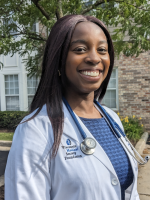
Oluwadara Okeremi
NIH Oxford Scholar MD/PhD
B.S., Bioengineering, Rice University, 2022
M.D., Medical College of Wisconsin (In progress)
Dr. P’ng Loke (NIAID) and
Prof. Goylette Chami (Oxford)
Infectious Diseases, Global Health, Immunology & Epidemiology
Growing up in the US, Malaysia, and Nigeria shaped Dara’s passion for global health and parasitic diseases. She developed an early interest in research during high school through a project using fruit flies to model type II diabetes in collaboration with Dr. Seung Kim at Stanford University. She earned her B.S. in Bioengineering with a Distinction in Research and Creative Work at Rice University in 2022.
At the University of Texas at Austin, she optimized machine learning models to generate cancer research abstracts through the Research Experience for Undergraduates program with Dr. Lan Luan. She also participated in the NIH Biomedical Engineering Summer Internship Program to characterize the malaria circumsporozoite protein using atomic force microscopy with Dr. Albert Jin and Dr. David Narum. At Rice, she used CRISPR-Cas9 to study cystic fibrosis with Dr. Gang Bao. Through the Baylor College of Medicine SMART Program, she worked with Dr. Kristy Murray and collaborated with the Belize Ministry of Health to investigate acute febrile illnesses and COVID-19 seroprevalence until the beginning of medical school.
Currently, Dara is studying schistosomiasis pathogenesis by integrating mouse immunology and human epidemiology. She is committed to advancing equitable healthcare and developing creative, data-driven solutions for underserved populations.
Outside of the lab, she enjoys travelling, going to concerts, and trying new restaurants.
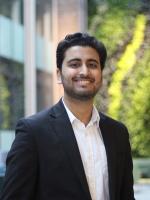
Om Gandhi
NIH Rhodes Scholar
B.A., Neuroscience and Public Health, University of Pennsylvania, 2025
M.S., Bioengineering, University of Pennsylvania, 2025
Dr. Ronald N. Germain (NIAID)
and Prof. Timothy Elliott (Oxford)
Cancer Biology, Immunology, and Imaging
Om's research passions center on developing better approaches to diagnose, monitor, and treat nervous system tumors. As an undergraduate at the University of Pennsylvania, he conducted research on perturbing the MYCN-polyamine axis to rewire tumor metabolism and promote immunotherapy in neuroblastoma under Dr. Michael Hogarty and Dr. Christina Turn at the Children's Hospital of Philadelphia (CHOP). There, he conducted mouse trials to assess the anti-tumor potential of different polyamine depletion strategies and developed downstream genomic and proteomic pipelines to better understand the therapies' biochemical mechanisms. While pursuing an M.S. in Bioengineering concurrently with his undergraduate education, Om became increasingly interested in engineering the endogenous immune system to fight solid tumors. Under Dr. Saar Gill and Dr. Nathan Welty at Penn Medicine's Center for Cellular Immunotherapies, he conducted research on genetically engineering myeloid hematopoiesis with the goal of developing chimeric antigen receptor (CAR)-macrophages that are both persistent and resistant to anti-inflammatory polarization by tumors. Additionally, complementing his laboratory work, Om collaborated with mentors across Penn Radiology and Penn Neurosurgery, including Dr. Abass Alavi, Dr. Christina Jackson, and Dr. Omar Choudhri, to develop novel imaging approaches for cancer diagnosis and treatment monitoring in clinical settings.
Outside the lab, Om worked to translate research findings into clinical applications and develop more effective global health policy solutions. He led the Wharton Undergraduate Healthcare Club, Penn Undergrad Biotech Society, and Locust Bioventures at the University of Pennsylvania, collaborating with academia, startups, non-profits, and government organizations in oncology.
Currently, Om is pursuing his PhD funded by the Rhodes Scholarship and NIH OxCam Scholars Program. With a strong translational focus, he continues to develop innovative immunotherapies for solid nervous system tumors under Dr. Ronald Germain at NIH and Dr. Tim Elliott at Oxford, synthesizing cancer biology, immunology, and imaging. As an aspiring physician-scientist, Om hopes to ultimately bridge research, clinical practice, and public health policy on the global stage to drive meaningful advances in cancer care and treatment accessibility worldwide
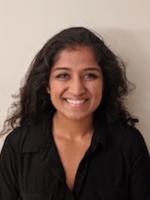
Poorva Jain
NIH Oxford Scholar MD/PhD
B.A., Biology and Neuroscience, Washington University in St. Louis, 2018
M.D., University of Miami College of Medicine (In progress)
Dr. Irene Cortese (NINDS), Prof. Agne Antanaviciute (Oxford),
and Prof. Hashem Koohy (Oxford)
Neuroinflammation, Adaptive immunity and immunotherapy development, Molecular Imaging and theranostics
Poorva graduated with honors from Washington University in St. Louis in 2018 with a B.A. in Biology: Neuroscience. As an undergraduate, she worked with Dr. Yehuda Ben-Shahar investigating the role of the potassium channel SEI in regulating neuronal excitability in periods of acute temperature stress. This project inspired a deep interest in using basic biology to understand complex mechanisms in neurologic disease.
After graduating, Poorva worked at the Molecular Imaging Program at Stanford as a Research Professional in Dr. Michelle James Lab. She was interested in developing novel cell-specific and sensitive radiotracers to image neuroinflammation in the context of neurodegenerative disease. She was specifically interested in discovering and validating novel biomarkers of microglia to visualize these heterogenous cells in vivo. Alongside her work as a researcher, she also worked part time as an Emergency Medical Technician providing basic life support to patients in transport.
In 2020, Poorva matriculated into the MSTP at University of Miami. Here she was heavily involved in MSTP programming including planning MSTP symposiums, clinical case reviews, journal clubs, and coordinating mentorship. While completing her clinical clerkships, she identified her medical interests in hematology/oncology and neurology. In summer of 2022, Poorva began her training in the OxCam program and plans to complete her Dphil as a collaboration between Dr. Irene Cortese at NINDS, and Profs. Hashem Koohy and Agne Antanaviciute at Oxford to study adaptive immunity in progressive multifocal leukoencephalopathy. Ultimately, Poorva dreams to remain in academia as a trained clinician, research leader, and professor.
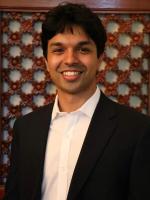
Pratik Koppikar
NIH Cambridge Scholar
B.S., The University of Texas at Dallas, 2023
Dr. Michael E. Ward (NINDS), Prof. Florian T. Merkle (Cambridge),
and Prof. Andrew Bassett (Cambridge)
Prime editing, Single-cell omics, Neuroscience
Pratik graduated from The University of Texas at Dallas summa cum laude, with Collegium V Honors, and as a Eugene McDermott Scholar. While an undergraduate, he worked to optimize microfluidic systems for the independent treatment of axons from soma for nociceptive involvement under the supervision of Dr. Joseph Pancrazio in the bioengineering department. In 2021, Pratik worked at PerkinElmer Genomics, now Revvity, to develop a novel primary screening assay for the lipid storage disease Cerebrotendinous Xanthomastosis. He has additionally conducted research as an undergraduate at the Yong Loo Lin School of Medicine at the National University of Singapore under Dr. Jai Polepalli, working to design a co-immunoprecipitation methodology for the quantification of the serotonin 5HT3A receptor, and at the Yale School of Medicine under Dr. Monkol Lek, where he helped develop a single-cell muscle cell atlas.
During his graduate study as an NIH Cambridge Scholar, Pratik will work to improve methods of prime editing stem cells and obtaining downstream pooled readouts. Coupling method development with single-cell transcriptome readouts, he will then investigate how individual variants affect phenotypic outcomes and disease states.
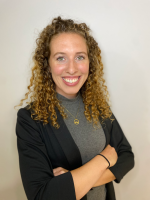
Rachel Smith
NIH Cambridge Scholar
B.S. Neuroscience, The College of William & Mary, 2019
Drs. Francis McMahon and Armin Raznahan (NIMH) and
Profs. Petra Vertes and Edward Bullmore (Cambridge)
Computational psychiatry, Neuroimaging, Transcriptomics
Rachel’s passion for computational neuroscience research began as an undergraduate at the College of William & Mary, where she engaged in both wet and dry lab research. She was awarded two fellowships to work with Dr. Lisa Landino, whose biochemistry research investigates the role of oxidative damage to proteins in neurodegeneration. After three years, Rachel’s work culminated in her honors thesis. In addition to this research, she worked in Dr. Greg Conradi-Smith’s computational biology lab to study neural networks involved in breathing. During this time, Rachel became excited about the power of using computational methods to address questions that are ethically or technically constrained in wet labs. As an undergraduate student, she spent her summers in Morocco and Palestine learning Arabic, teaching English, and interning at a women’s empowerment agency. These experiences heightened her desire to work with scientists from communities that are historically underrepresented in Western science to address issues that disproportionately affect those populations. In 2019, Rachel graduated summa cum laude and Phi Beta Kappa with a B.S. in neuroscience and a minor (and dual passion) in Arabic language and literature.
Upon completing her undergraduate education, Rachel joined the vascular physiology lab of Dr. Hans Ackerman as a post-baccalaureate fellow at the Laboratory of Malaria and Vector Research at the NIH. Throughout her two years in the lab, Rachel engaged in a diverse set of research projects using a wide variety of methodologies, ranging from time-resolved fluorescence and immunological techniques at the bench to transcriptomic and time series signal analyses on the computer. During the 2020 pandemic, she contributed to her lab’s COVID-19 research project. With Dr. Ackerman’s support, her work resulted in several first- and co-authored publications, as well as numerous posters and invited talks. During this time, Rachel also earned a certificate in data science through Johns Hopkins University.
As an NIH-Cambridge Scholar, Rachel plans to use transcriptomics and neuroimaging to study the role of early life stress and trauma in increasing vulnerability to psychiatric disorders in adulthood. After graduation, she hopes to focus her research on the psychiatric impact of the chronic trauma experienced by oppressed peoples. Outside of lab, Rachel is a competitive ultramarathon runner who enjoys lifting, being outdoors, and spending time with dogs.
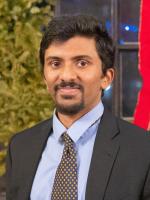
Rahul Subramaniam
NIH Oxford Scholar
B.A., Biomedical Engineering and Physics, Harvard University, 2023
Dr. Manu Platt (NIBIB) and
Prof. Dame Molly Stevens (Oxford)
Engineered in vitro disease models, Vascular disease, Tissue engineering
Rahul graduated magna cum laude with highest honors in his field from Harvard University in 2023, where he double majored in Biomedical Engineering and Physics, completing coursework ranging from tissue engineering and fluid mechanics to quantum mechanics and particle physics. He carried out his undergraduate research in the lab of Prof. William Shih at the Harvard Wyss Institute for Biologically Inspired Engineering, where he designed and built DNA origami nanostructures that mimicked the cellular protein clathrin. These nanostructures mimicked both the monomer- and polymer-level structure and behavior of clathrin, and could be applied to improving nucleic acid diagnostics or nanofabrication of large-scale lattice structures. This research culminated in his senior thesis, which won highest honors from the Biomedical Engineering department, and sparked his interest in shedding light on complex biological systems using simple yet powerful engineered models. To gain a better understanding of the clinical applications of research, Rahul worked as a surgical technician in a skin cancer clinic for a year after graduating. In May 2024, in recognition of his passion for and achievements in research, he was awarded a graduate fellowship from the Lawrence Livermore National Laboratory and the University of Southern California to help support his graduate studies.
Rahul will continue his research as an NIH Oxford Scholar in the labs of Dr. Manu Platt at NIBIB and Prof. Dame Molly Stevens at Oxford, where he will work on drug delivery methods to treat arterial blockages in patients with sickle cell disease, as well as 3D bioprinting patient-specific models of arteries affected by sickle cell disease to better understand fluid flow, blockage formation and treatment possibilities.
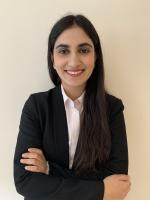
Rhea Kataria
NIH Cambridge Scholar MD/PhD
B.S. Mathematics and Chemistry, Tulane University, 2020
M.D., University of Chicago (In progress)
Dr. Louis Staudt (NCI) and
Prof. Daniel Hodson (University of Cambridge)
Stem Cell Biology, Regenerative Medicine, Drug Development
Rhea graduated with honors from Tulane University with a degree in Mathematics and Chemistry, where she participated in the research groups of Dr. James Hyman and Dr. Bruce Gibb. Following graduation, she completed a two-year postbaccalaureate fellowship in the lab of Dr. Michael Lenardo at NIAID. There, Rhea studied the effects of genetic mutations underlying primary immunodeficiencies, specifically how they cause dysregulation of T-cell biology. Using in-vitro experiments on patient samples, and an in-vivo mouse system, Rhea helped to characterize how a loss of the protein iRHOM2 causes a pleiotropic disease in patients by compromising the activity of the metalloprotease ADAM17, which cleaves key inflammatory cytokines from the T-cell membrane such as TNF. This work was published in the journal Nature Immunology.
Most recently, Rhea completed her first two years of medical school at the University of Chicago Pritzker School of Medicine, before entering the NIH Oxford-Cambridge Scholars Program for her PhD training under the mentorship of Dr. Louis Staudt and Dr. Daniel Hodson. As an NIH-Cambridge Scholar, Rhea seeks to study the mechanisms underlying the different sub-groups of Diffuse Large B-Cell Lymphoma and characterize new targets for immune-therapies and potential treatments of this disease.

Rose Ana Summers
NIH Cambridge Scholar
B.A. Integrative Physiology, University of Colorado-Boulder, 2023
Dr. Daniel Reich (NINDS) and
Prof. David Rowitch (Cambridge)
Neuroimmunology, Stem Cells, Development of Regenerative Therapies
I grew up on a wildflower meadow in the Rocky Mountains above Boulder, Colorado. My first involvement in research was as an assistant in the Behavioral Neuroendocrinology Lab where I helped to identify a novel anti-inflammatory therapy for shift workers. This inspired me to intern in the Harvard Macklis Lab as an Amgen scholar, where I worked with cortical and spinal organoids while modeling the formation of human neural circuitry during development. The culmination of these unique experiences allowed me to develop a passion for both neuroimmunology and the utilization of organoid models, leading me to join the CU Center for Alzheimer’s and Cognition and conduct my independent research project on the generation of microglia-containing cerebral organoids as models of Down syndrome-associated Alzheimer’s disease. As an OxCam scholar, I will be collaborating with Dr. Reich at the NINDS and Dr. Rowitch at the Wellcome-MRC Cambridge Stem Cell Institute on a project that will utilize organoids and other stem cell-based models to illuminate the cellular mechanisms driving Multiple Sclerosis pathology and aid in the identification of therapeutic targets. My overarching goal is to become a physician-scientist and improve the quality and length of life for patients with neurological disorders through my contributions to both research and clinical care.
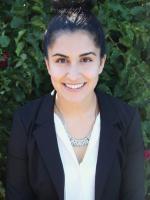
Sahba Seddighi
NIH Oxford Scholar MD/PhD
B.A. Neuroscience, University of Tennessee, 2016
MPhil Epidemiology, University of Cambridge, 2018
M.D., Johns Hopkins School of Medicine (In progress)
Dr. Michael Ward (NINDS) and
Prof. Cornelia van Duijn (Oxford)
Neurodegeneration, Molecular & genetic epidemiology, Functional genomics
Sahba graduated summa cum laude from the University of Tennessee in 2016, with a BA in neuroscience. She pursued her first research experience through the NIH Summer Internship Program, during which she studied the innate immune response in multiple sclerosis. As an Amgen Scholar, Sahba spent the next summer working on a novel therapy for Alzheimer’s disease in the laboratory of Dr. Frank Longo at Stanford University. Intrigued by the possibility of uncovering targets for early intervention, she then continued this line of work at the Cajal Institute in Spain for a semester. At UT, she also spent three years in the Cooper Lab, completing and defending an honors thesis on brain and behavioral adaptations throughout the lifespan. Her undergraduate research received awards at numerous scientific conferences and was published in Physiology and Behavior and Behavioral Neuroscience. She also received the Chancellor’s Extraordinary Professional Promise Award and was named Class of 2016 Torchbearer in recognition of her academic achievements and contributions to the university and local community.
After graduating, Sahba studied Alzheimer's disease as an IRTA Fellow in Dr. Madhav Thambisetty’s group at the NIH National Institute on Aging. This year-long fellowship culminated in four publications, including two as first author. With a growing interest in population-based research on dementia, Sahba was then awarded a Gates Cambridge Scholarship to pursue an MPhil in epidemiology at the University of Cambridge. Her MPhil dissertation demonstrated a causal, genetic link between Alzheimer’s disease and cancer and was published in Scientific Reports.
Sahba joined the Johns Hopkins School of Medicine MSTP in 2018 and has since completed the first two years of medical school. During this time, she also served on the Alzheimer’s Congressional Team to advocate for patient-centered legislation and increased research funding from the federal government. As an NIH-Oxford student, Sahba plans to leverage insights from large-scale, epidemiological studies to guide basic science investigations into the pre-symptomatic stages of neurodegenerative disorders. Ultimately, she hopes to pursue a career as a physician-scientist dedicated to reimagining care for patients with Alzheimer’s disease and other neurodegenerative disorders.
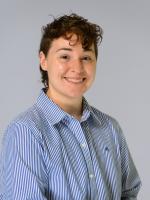
Sam Shafer
NIH Cambridge Scholar MD/PhD
B.S., Microbiology and Molecular Biology, Oklahoma State University, 2019
M.D., Emory University School of Medicine (In progress)
Dr. Steven Holland (NIAID) and
Prof. Clare Bryant (Cambridge)
Mucosal immunity, Autoantibodies, Interstitial lung disease
Sam previously worked in mucosal immunity with patients diagnosed with early onset colitis and mutations in ST6GALNAC1. Currently, their research focuses on the mucosal immunity and genetics of autoimmune and inflammatory conditions affecting the lungs such as interstitial lung disease and sarcoidosis.
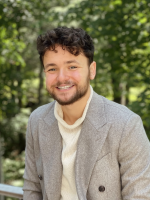
Sam Norwitz
NIH Gates Cambridge Scholar
B.A., Washington University in St. Louis, 2023
Dr. Chris McBain (NICHD) and
Dr. Kate Baker (Cambridge)
Pediatric Neuroscience, Neurodevelopmental Disorders, Synaptic Vesicle Trafficking
Sam completed his B.A. at Washington University in St. Louis where he graduated valedictorian with majors in Biology, Neuroscience, and Children's Studies. He spent three years researching the effects of socioeconomic status on childhood brain development as part of the Human Connectome Project, the Cognitive Control & Psychopathology Lab, and the Department of Child & Adolescent Psychiatry under the mentorship of Professor Deanna Barch. Outside the lab, he founded the region's first Special Olympics program, where he became interested in the biological underpinnings of the neurodevelopmental disorders in the children he coached. He also served as President of Synapse Neuroscience Organization, working with inner city schools to promote STEM education.
As both a Gates Cambridge Scholar and NIH OxCam Scholar, he will complete his PhD in the MRC Cognition & Brain Sciences Unit at the University of Cambridge. The goal of this research is to better understand the molecular and genetic mechanisms underlying childhood neurodevelopmental disorders, such as SYT1-related Baker-Gordon syndrome under the mentorship of Dr. Kate Baker (Cambridge) and Dr. Chris McBain (NICHD). When note in the lab, he can be found on the 'football' field or playing his guitar alongside the River Cam.
After completing his PhD, Sam plans to return to the U.S. for medical school. His long-term goal is to become a physician-scientist with a focus on pediatric neuroscience, seeking international dialogue and research collaboration in bettering the lives of children with neurodevelopmental challenges.
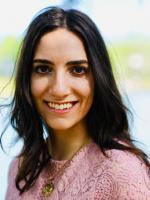
Samantha Lish
NIH Oxford Scholar
B.A. Physics and Art, Macaulay Honors College CUNY
Dr. Alexander Cartagena-Rivera (NIBIB)
and Prof. Ramin Golestanian (Oxford)
Biomedical optics, Mathematics, Theoretical biophysics
Samantha is a graduate of the Macaulay Honors Program at Hunter College of the City University of New York, where she received a degree with a double major in Physics and Studio Art, and a minor in Mathematics. During her undergraduate career, Samantha was inducted into the Phi Beta Kappa International Academic Honor Society, received the Gillet Memorial Prize for excellence in Physics, the John P. McNulty Research Award for Leadership in Math and Science, and the Toulmin Healthcare Merit Scholarship, which supported her work in Biophotonics. Samantha believes that in order to problem-solve, it is helpful to call upon influences from many different fields. In addition to being a scientific thinker, she is an artist, which gives her an added appreciation for the beauty of mathematics and characteristic patterns of disease in image processing and 3D modeling. Her research has focused on developing computational and optical tools to guide medical diagnostics. Samantha spent four years as a research assistant at The Rockefeller University analyzing microscopic properties of tissue, applying feature engineering and machine learning techniques to characterize disease patterns for quantifiable metrics, and developing 3D-bioprinting assays. At Hunter’s Biomedical Photonics lab, Samantha spearheaded a project to extract diagnostic value from differences in cancer fractal geometric parameters. She applied these image processing and laser physics techniques as a part of the Harvard-MIT Wellman Center for Photomedicine, where she investigated the biocompatibility of integrating intracellular micro-resonators into a spheroid cancer model and developed a quantitative approach to track and tag these laser particles. As an NIH OxCam Scholar, in partnership with the NIBIB at the NIH and the Department of Theoretical Physics at Oxford University, Samantha will utilize the formalism of mathematics, mechanobiology, and quantum mechanics to uncover emergent geometrical properties that arise from the unique spatial distribution and collective migration of organotypic cells. Upon graduation hopes to pursue an academic research career and become a professor at the university level.
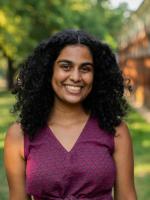
Shreya Chappidi
NIH Cambridge Scholar
B.A. Cognitive Science, Public Policy and Leadership,
University of Virginia, 2022
Dr. Andra Krauze (NCI)
and Dr. Jat Singh (Cambridge)
Oncology, Machine learning, and Human computer interaction
Shreya graduated from the University of Virginia with degrees in Cognitive Science and Public Policy & Leadership. Here, she sought out ways to combine her background in molecular biology research and interests in medicine with her studies of computer science and public policy. She worked as a teaching assistant for organic chemistry courses and served as a Research Assistant at the interdisciplinary Institute for Law, Psychiatry, & Public Policy. She also worked at Microsoft Research for two summers as an undergraduate intern and then researcher in the Adaptive Systems & Interaction group on several projects and papers related to user experience and human-AI collaborations in healthcare.
After graduating, she worked on natural language processing algorithms for clinical documents as a postbac research fellow in a joint collaboration with Dr. Frank Maldarelli at the National Cancer Institute and Dr. Govind Bhagavatheeshwaran at the National Institute for Neurological Disorders and Stroke.
In the NIH Oxford-Cambridge Scholars Program, she works with Dr. Andra Krauze in the Radiation Oncology Branch at the National Cancer Institute and Dr. Jat Singh in the Compliant and Accountable Systems Group in the Department of Computer Science and Technology at the University of Cambridge. Through this collaboration, she is developing and exploring the interpretability of machine learning algorithms using multi-modal clinical oncology data.
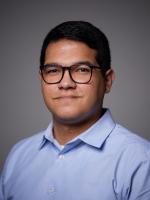
Sinibaldo R. Romero Arocha
B.S., North Dakota State University, 2014
M.D., University of Minnesota Medical School (In progress)
Dr. Michael Sack (NHLBI), Dr. Laura Coates (Oxford),
and Dr. Alexander Clarke (Oxford)
Immunology, Metabolism, Dermatology
Sinibaldo was born and raised in Venezuela. He pursued his college studies in the US at North Dakota State University in Fargo, North Dakota. There, he double majored in Zoology and Biotechnology. During his undergraduate studies, he worked with Dr. Peggy Biga to study teleost fish growth paradigms (determinate vs. indeterminate). He also pursued a summer internship at the Harvard Stem Cell Institute, under the mentorship of Drs. David Breault and Diana Carlone, characterizing how mTert-expressing cell populations in bone are affected during aging.
After graduating from college, he joined Dr. Virginia Shapiro's laboratory at the Mayo Clinic as a Research Assistant to study the development and activation of T cells. He then joined the Mayo Clinic's Post-Baccalaureate Research Program under the mentorship of Drs. Atta Behfar and Andre Terzic, optimizing a stem cell platform using human umbilical cord-derived mesenchymal stem cells and microencapsulated-modified-messenger RNA to improve remodeling and function in myocardial ischemic injury.
Sinibaldo began his medical degree at the University of Minnesota in 2020. After completing his first preclinical training, he joined the University of Oxford to pursue his DPhil. He is mentored by Dr. Michael Sack (NHLBI), Dr. Laura Coates (Oxford), and Dr. Alexander Clarke (Oxford). His project will investigate changes in metabolism and the immune system of patients with psoriasis. After completing his DPhil, Sini will complete his medical training at the University of Minnesota and aims to join a Physician Scientist Training Program during residency.
Outside of the lab, Sini enjoys cooking, traveling, reading, and sports.
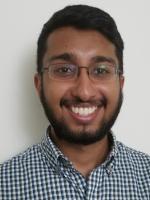
Sooraj Achar
NIH Oxford Scholar
B.S. Biochemistry, University of Virginia
Dr. Gregoire Altan-Bonnet (NCI)
and Prof. Mike Dustin (Oxford)
Immunology, Computational and systems biology, Cancer Biology
As an undergraduate at the University of Virginia, Sooraj performed computational biology research under the supervision of Professor Cameron Mura. His research in Professor Mura’s group involved using molecular dynamics simulations to gain a better understanding of the kinetics of protein-RNA binding interactions in bacterial RNA chaperones. He also conducted research at the NIDDK with Dr. Caroline Philpott, where he analyzed the interaction dynamics of two cytosolic mammalian iron chaperones using immunoprecipitation assays and molecular docking. Upon graduation, Sooraj joined the laboratory of Dr. Gregoire Altan-Bonnet at the NCI as an NIH post baccalaureate fellow, where his project focused on deconvolving the effects of the quality (TCR binding affinity) and quantity (surface density) of an antigen on T cell activation. During the course of this research project, Sooraj developed and optimized a robotic platform and data processing pipeline to allow for high time resolution measurements of many aspects of T cell activation dynamics. In his doctoral research project, he aims to combine these robotics-based temporal measurements with microscopy-based spatial measurements of immune cell activation to gain a holistic understanding of how T cell activation is governed by antigen quality. His eventual goal is to apply these techniques to analyze CAR-T cell activation to produce more robust pre-clinical metrics for assessing immunotherapy efficacy.
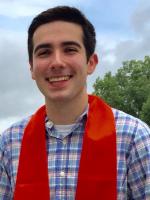
Stanley Fayn
NIH Oxford Scholar
B.S., Molecular and Cellular Biology,
University of Illinois at Urbana-Champaign, 2020
Dr. Freddy Escorcia (NCI) and
Prof. Katherine Vallis (Oxford)
Molecular Theranostics, Bioengineering, Radiation Oncology
Stanley graduated from the University of Illinois at Urbana-Champaign in May 2020 with a B.S. in Molecular and Cellular Biology. During his time there, he was part of the Experimental Molecular Imaging Laboratory, where he focused on the development and characterization of a nanoparticle-based imaging agent targeted at the receptor for advanced glycation end-products (RAGE). His interests in oncology, imaging, and molecular theranostics led him to pursue a fellowship at the National Cancer Institute to focus on developing new vehicles for early diagnosis and treatment of cancer. As part of the laboratory of molecular radiotherapy, he focused on designing, synthesizing, and characterizing novel single-domain antibody (nanobody) and peptide-based imaging probes for liver cancer.
As a student in the OxCam program, Stanley will continue his work on developing diagnostic and therapeutic agents for cancer, exploring more closely the radiobiological pathways activated, manipulating them to maximize therapeutic efficacy, and identifying opportunities for synergy.
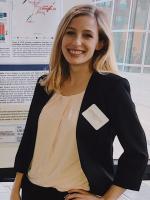
Stephanie Spada
NIH Oxford Scholar
B.S., Cell and Molecular Biology,
University of Rhode Island, 2020
Dr. Sonja Best (NIAID), Dr. Fadila Bouamr (NIAID),
Dr. Michael Grigg (NIAID), and Dr. Peijun Zhang (Oxford)
Viral Pathogenesis, Structural Biology, Innate Immunity
Stephanie graduated cum laude from the University of Rhode Island (URI) in 2020 with a degree in cell and molecular biology and minor in chemistry. While at URI she worked under Dr. Marta Gomez-Chiarri for two years where she was introduced to the field of aquatic pathology and learned to utilize quantitative microbiology and aquatic husbandry to develop strategies to protect marine life and aquaculture systems from infectious diseases. Her senior year she was awarded an Undergraduate Research and Innovation(URI2) grant to understand the pathogenic relationship between climatic variation and the emergence of a bacterial isolate causing mortality in wild fin-fish populations from the Galapagos.
Post-graduation, she desired further experiences understanding the molecular details of microbial pathogenesis and joined the laboratory of Dr. Vanessa Hirsch at the NIH as a postbaccalaureate fellow. Alongside mentor, Dr. Fadila Bouamr, she conducted experiments elucidating mechanisms of the endosomal sorting complex required for transport (ESCRT), host cell machinery hijacked by most human RNA viruses, to address questions regarding transmission of HIV-1 virions. In addition, she worked on a project developing an oral-based vaccine capable of inducing neutralizing antibodies against SARS-CoV-2 in collaboration with Dr. Michael Grigg and his lab.
Throughout her two years as a postbaccalaureate fellow, Stephanie became fascinated with the intrinsic cellular barriers to viral infection studying the role of antiviral restriction factor, TRIM5alpha, and its implications in pathogenesis of retroviruses as well as flaviviruses in an on-going collaboration with Dr. Sonja Best. She will continue characterizing novel restrictive functions of TRIM5alpha as an NIH-Oxford Scholar which she hopes may strengthen insights into viral pathogenesis and the development of antiviral therapies. Working alongside Oxford mentor, Dr. Peijun Zhang, she hopes to learn and harness the powerful technologies of high-resolution imagining for a firm structure-function understanding of TRIM5alpha recognition mechanisms.
Believing that the fight against the global burden of pathogens relies on an understanding of their basic biology, Stephanie plans to continue expanding her arsenal of technical skills and knowledge to study host-virus interactions. She hopes her efforts will contribute to the development of preventative measures and treatments.
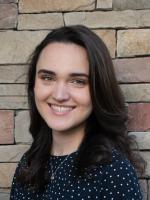
Stephanie Williams
NIH Oxford Scholar
B.S. Microbiology, Virginia Tech, 2017
Dr. Jeffery Taubenberger (NIAID)
and Prof. Ervin Fodor (Oxford)
Emerging viral diseases, Pathogenesis, Evolution
Stephanie’s research experiences have been a blend of microbiology and virology. While in the lab of Dr. Ann Stevens at Virginia Tech, she worked to characterize the unique genome and metabolic capabilities of an emerging bacterial strain of Vibrio parahaemolyticus that causes Early Mortality Syndrome (EMS) in shrimp which has significant impacts on the aquaculture industry where it’s endemic. Additional to her academic research experience, Stephanie had the opportunity to conduct research with BEI Resources at American Type Culture Collection located in Manassas, VA to develop a safe and immunogenic Virus-Like Particle (VLP)-based vaccine against Zika virus as a part of their internship program. Upon graduating from Virginia Tech in 2017, Stephanie remained on campus as lab technician in the lab of Dr. Jonathan Auguste to study and develop vaccines for variety of vector-borne viruses such as Mayaro, Chikungunya, and Zika viruses. Since 2018, Stephanie has been a member of the Viral Pathogenesis and Evolution Section run by Dr. Jeffery Taubenberger at the National Institutes of Health studying influenza and SARS-CoV-2. Stephanie’s research uses a combination of molecular virology, animal models, and bioinformatics to characterize the hemagglutinin (HA) pathogenicity of the 1918 Pandemic and Classical Swine influenza A viruses. Using the data from this study, the lab aims to uncover answers behind the virulence of the 1918 influenza virus. In her years of research, she has generated four publications, of which she has one first authorship. Stephanie has been recognized by Virginia Tech’s Department of Biological Sciences for her research efforts and was inducted into the university’s Phi Beta Kappa and Phi Sigma chapters for being a dedicated and well-rounded researcher in the biological sciences.
Stephanie plans to follow her passion for emerging and re-emerging viral diseases upon graduation and seek out research opportunities to study their evolution and pathogenesis. She hopes that her future endeavors could be useful in developing better preventative measures, treatments, and overall lessen the burden of emerging viral diseases on global health.
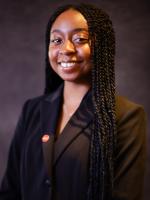
Theressa Ewa
NIH Cambridge Scholar
B.S., Biochemistry,
University of Illinois at Chicago, 2020
Dr. Xin W. Wang (NCI) and
Dr. Daniel Muñoz-Espin (Cambridge)
Cancer Biology, Cancer Detection, Cancer Prognosis and Prediction
Born and raised in Lagos, Nigeria, I immigrated to the United States at the age of thirteen. Growing up, I was passionate about wanting to change the healthcare system in my local community. My passion and my strong interests in STEM, led me to pursue Biochemistry at the University of Illinois at Chicago (UIC), gaining first-hand exposure to what research in STEM meant.
As part of the Presidential Awards Program STEM Initiative program at UIC, I was able to explore different research areas. During my freshman and sophomore years, I studied the effect of greenhouse gases in the Arctic, analyzing soil and gas samples. The summer after my sophomore year, I had the privilege of participating in a 10-week research program at the University of Delaware. Under the supervision of Dr. Liyun Wang, I studied the impacts of the mechanosensitive ion channels, piezo 1 and 2, in osteoporosis and osteoarthritis. The immunolabeling, hands on techniques, and skill-sets I acquired during the 10-week program propelled me into similar research labs at my own institution. Thus, for my Honors capstone at UIC, I studied the role of the gene Tbx2 in pericytes and its relation to loss of vision in Diabetic Retinopathy, under the supervision of Dr. Henar Cuervo in the Department of Physiology and Biophysics.
These research experiences took my viewpoints of STEM and how I can better the healthcare system to another level. I realized I can make impactful contributions to the healthcare system through research. So, in my last semester of undergraduate studies, I applied for a post-baccalaureate Intramural Research Training Award (IRTA) fellowship at the National Institutes of Health (NIH). I decided that my fellowship had to be in the cancer field. This is a disease that not only personally affected me and my family, but made me passionate about STEM to begin with. Thus, under the supervision of Dr. Christine Alewine at the National Cancer Institute (NCI), I studied pancreatic cancer. Specifically, I studied the characteristics of the GPI-anchored protein mesothelin and its role in an immunocompetent mouse model. I also contributed to the study of soluble mesothelin and how it potentially acts as a signaling molecule and promote tumorigenicity.
As a NIH-Scholar, I’ll be furthering my studies in cancer research at the NCI and the University of Cambridge, under the supervision of Dr. Xin W. Wang and Dr. Daniel Muñoz-Espin, respectively. My thesis will focus on studying liver and lung cancer, with goals to develop preclinical models to study tumor senescence and metastasis for better early detection and diagnosis of cancer.
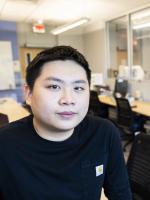
Tuan Vinh
NIH Oxford Scholar
B.A.(Hons) in Biology, Chemistry, and Computer Science, Emory University, 2025
Dr. Keji Zhao (NHBLI) and
Prof. Christopher Schofield (Oxford)
Chemical Biology, Computational Modelling, Genomics
Tuan Vinh holds a strong interdisciplinary foundation in chemistry, biology, and computer science, graduating with highest honors from Emory University. As an undergraduate, he contributed to multiple research projects at the interface of chemical biology and proteomics in the Raj Lab, where he developed novel probes for profiling methylated lysine and N-terminal modifications in proteins. His honors thesis introduced a unique cysteine-mimicking strategy to globally capture methylated proteoforms, combining chemical innovation with mass spectrometry-based proteomics. Tuan also gained experience in computational modeling and cheminformatics through independent projects.
He aims to understand how low-oxygen (hypoxic) environments reshape gene expression programs and alter chromatin architecture across diverse cell types. By integrating chemical biology tools, systems proteomics, and deep learning, he plans to identify key enzymes and epigenetic regulators that mediate the cellular response to hypoxia. His long-term goal is to uncover novel, druggable targets for hypoxia-driven diseases such as cancer, with the broader vision of developing targeted therapeutics that modulate chromatin states under disease-specific microenvironments.
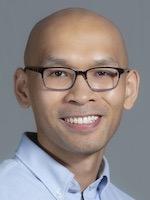
Tung Nguyen
NIH Cambridge Scholar MD/PhD
B.S., Biology, Brown University, 2017
M.S., Pathobiology, Brown University, 2017
M.D., University of Wisconsin School of Medicine (In progress)
Dr. Elodie Ghedin (NIAID) and
Dr. Pietro Sormanni (Cambridge)
SARS-COV2, Evolution, Computational
Tung developed an interest in genomics in immunology as a 2016 NYU SURP student with Dr. Dan Littman and pursued experimental genomics at the Broad Institute of MIT and Harvard. As a research associate of Drs. Eric Lander and Jesse Engreitz, he investigated the noncoding genome in immune-mediated diseases. After witnessing the effects of COVID-19 on patientcare during medical school at UW-Madison, he became interested in how SARS-CoV-2 evolves, especially in immunocompromised hosts. His research at NIAID and University of Cambridge aims to infer SARS-CoV-2 genomic epidemiology and viral evolution at antibody epitopes. After completion of the PhD, he will return to the University of Wisconsin to complete his last year of medical training in 2027
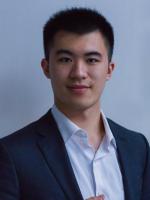
Wesley Tung
NIH Oxford Scholar MD/PhD
B.S., University of Illinois at Urbana-Champaign, 2019
M.D., Yale University (In progress)
Dr. Helen Su (NIAID) and
Prof. Jelena Bezbradica-Mirkovic (Oxford)
Immunology, Infectious Disease, Molecular/Clinical Genetics
I completed my undergraduate degree at the University of Illinois at Urbana-Champaign, where I worked in the lab of Dr. Wenyan Mei studying the role of the RNA-binding protein, hnRNPI, in intestinal homeostasis. During my time as an undergraduate, I also completed two internships, one at the Mayo Clinic and the other at the NIDDK. At the Mayo Clinic, I worked under Dr. Richard Vile and worked to develop mouse models to study diffuse intrinsic pontine glioma, a rare and lethal form of pediatric brain cancer. At the NIDDK, I worked under Dr. Jurgen Wess, studying the role of beta-adrenergic receptors in adipose tissue. After graduating, I spent two years as a post-bac researcher in the lab of Dr. Helen Su (NIAID) , where I studied the genetic contributions of RIG-I receptors in anti-viral defense, specifically influenza and SARS-CoV-2.
As an MD/PhD student at Yale University partnered with the NIH OxCam program, I partnered with Dr. Akiko Iwasaki at Yale University in addition to Dr. Jelena Bezbradica (Oxford) and Dr. Helen Su to complete my thesis work. I am currently working on numerous projects, ranging from examining the differences in immune response in pregnant mothers to SARS-CoV-2 infection, to studying inborn errors of innate and adaptive immunity.
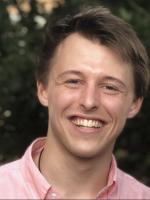
Will Snyder
NIH Gates Cambridge Scholar
B.S. Neuroscience, Bucknell University, 2021
Dr. Armin Raznahan (NIMH) and
Prof. Ed Bullmore (Cambridge)
Neuroimaging, Psychiatry, Genetics & transcriptomics
Will graduated summa cum laude from Bucknell University in 2021 with a B.S. in Neuroscience. He started developing neuroimaging methods in high school, examining large, publicly available autism fMRI datasets. During his first year at Bucknell, Will began training with Dr. Vanessa Troiani’s neuroimaging lab at the Geisinger-Bucknell Autism and Developmental Medicine Institute. Captivated by the potential of mathematics to advance brain mapping, he spent his four years with the lab creating tools to describe brain structure and function using graph theory and statistics. He focused on the orbitofrontal cortex, automating methods to help study how certain brain folding patterns confer risk for multiple psychiatric disorders. Continuing his study of autism spectrum disorders, he created a novel meta-analysis to evaluate the relationship between atypical brain function and symptoms.
Through several internships, Will gained further appreciation for how imaging methods can capture the intricacies of the brain. With Dr. Soohyun Lee at the NIMH, he helped automate large-scale calcium imaging of mouse neurons. With Dr. Lucina Uddin at the University of Miami, he led a large study of human salience network brain dynamics across the life span. With Dr. Jurgen Dukart at the Forschungszentrum Julich, he explored how drugs impact the correspondence between signals in simultaneously collected EEG and fMRI. His experiences led him to be awarded a Goldwater scholarship, to be offered an NSF graduate fellowship, and to publish three first-authored publications.
As an NIH Gates Cambridge scholar, he will work with Prof. Ed Bullmore at Cambridge and Dr. Armin Raznahan’s at the NIMH to explore relationships between brain networks and cortical folding. Will hopes to contribute to the growing field of precision medicine, advancing treatments for disorders based on markers in the brain.

William Serkin
NIH Oxford Scholar
B.S., Northeastern University, 2020
Dr. Ronald Germain (NIAID) and
Prof. Isabela Pedroza-Pacheco (Oxford)
Immunology, Tumor Microenvironment, Systems Biology
William graduated from Northeastern University with a B.S. in Cell and Molecular Biology and undergraduate training in multiple academic and industry labs. With a special interest in translational science, he joined the immunology team at eGenesis, Inc. after graduation in 2020. There, he contributed to the company’s work pioneering xenotransplantation, or the use of pig organs to solve the human organ shortage. His work focused primarily on understanding antibody mediated rejection and broad B cell responses in nonhuman primate xeno-kidney recipients.
As an NIH OxCam scholar, William will continue studying how coordinated cellular interactions drive adaptive immune responses. Mentored by Dr. Ronald Germain (NIAID) and Dr. Isabela Pedroza-Pacheco at the Centre for Immuno-Oncology at Oxford, William will apply multiplexed 3D imaging and systems biology approaches to understand how the formation and organization of tertiary lymphoid structures affect anti-tumor immunity.
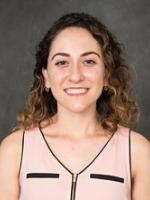
Yasemin Cole
NIH Gates Cambridge Scholar
B.S. Biology, University of North Carolina, 2016
M.Sc. Genomic Medicine, Imperial College London, 2017
M.D., University of North Carolina School of Medicine (In progress)
Dr. Zhengping Zhuang (NCI) and
Dr. Eamonn Maher (Cambridge)
Cancer genomics, Metabolism, Bioinformatics
Yasemin Cole was born and raised in Raleigh, North Carolina. Her scientific curiosity was sparked in high school after her same-aged cousin was diagnosed with medulloblastoma. This experience motivated her to pursue clinical experiences and a research internship with Dr. Aziz Sancar’s circadian rhythms of DNA repair laboratory, at the University of North Carolina School of Medicine (UNC SOM), over multiple summers.
She subsequently studied biology and medical anthropology at UNC at Chapel Hill. Yasemin joined Dr. Anton Jetton’s lab at the National Institute of Environmental Health Sciences as an IRTA fellow with the Summer Internship Program. She worked with Dr. Gary ZeRuth over two summers to investigate Glis3 regulation and the role of Glis3 on the transdifferentiation of pancreatic exocrine cells as a therapeutic option for type I diabetes. She likewise flourished in the lab of Dr. Jeannette Cook, where her studies culminated in her senior honors thesis on the regulation of the cell cycle protein Cdt1 by phosphorylation. Her aforementioned research experiences were published in PLOS ONE and MBoC. Concurrent to her research work, she found a deep connection between scientific advancement and medical progress. This led her to design and teach a course offered to UNC undergraduates called “The Past, Present, and Future of Medicine,” which covered a range of topics from Fleming’s penicillin discovery to the human genome project. She was awarded a Student Undergraduate Teaching Award for her teaching excellence and creation of a dynamic learning environment.
After graduating in 2016 with Highest Distinction and Honors, she decided to follow her interest in personalized medicine by completing a Master of Science in Genomic Medicine at Imperial College London. With the Dean’s Master’s Scholarship, she completed foundational genomic coursework and joined the lab of Professor Anne Bowcock at the National Heart and Lung Institute. There, she completed her master’s thesis on the genomics of uveal melanoma tumorigenesis. The specific aims of her investigation were to evaluate the sequence of genomic events leading to tumor development utilizing Sanger sequencing and FISH. After studying phenotype aware approaches to whole-exome sequencing in the laboratory of Dr. Jonathan Berg at UNC SOM, she began her MD/PhD studies at the same institution with the long term goal of becoming a physician-scientist.
In total, her research experiences motivated her to study the genomic and molecular mechanisms of cancer with the goal of applying this knowledge into translational precision medicine diagnostics and therapeutics. After completing basic medical science coursework and multiple clinical electives, she is now working with Dr. Zhengping Zhuang (NCI) and Professor Eamonn Maher (Department of Medical Genetics). As an NIH Gates Cambridge Scholar, she plans to study the genomic and metabolic underpinnings of the neuroendocrine tumors paragangliomas, pheochromocytomas, and gastrointestinal stromal tumors. Outside of research, she is deeply committed to refugee health, genetics outreach, and mentorship.
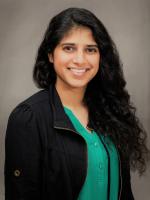
Yasmin Mann
NIH Oxford Scholar
B.S. Biology & Neuroscience, University of Delaware, 2020
Dr. Naomi Taylor (NCI), Dr. John Glod (NCI),
and Prof. Hashem Koohy (Oxford)
Cancer biology, Immunology, Metabolism
Yasmin graduated summa cum laude from the University of Delaware with an Honors Bachelor of Science Degree in biology and neuroscience with a minor in biochemistry. Her passion for research comes from her love of biology and drive to help others. Yasmin’s first research experience was during the summer of 2017 at the Alfred I. duPont Hospital for Children through the Nemours Summer Undergraduate Research Program. There she worked under the supervision of Dr. Zhengyu Ma to investigate whether tuning the binding affinity of chimeric antigen receptor (CAR) T cells could improve tumor targeting. This was done by creating 3 anti-human epidermal growth factor receptor 2 (HER2) CAR constructs that varied in binding affinity using site-directed mutagenesis. Yasmin’s next summer was spent at the Fox Chase Cancer Center as a University of Delaware-Fox Chase Cancer Center research fellow. As a student of Dr. Erica Golemis, she examined the effects of anti-cancer drugs on primary cilia-associated platelet-derived growth factor receptor alpha (PDGFRα) signaling using western blotting and immunofluorescence microscopy. The poster created from this work won her 1st place in the poster presentation competition during the Undergraduate Research Symposium in the Chemical and Biological Sciences at the University of Maryland Baltimore County in 2018. Yasmin also began working with Dr. Carlton Cooper, Dr. Randall Duncan, and Dr. Kenneth van Golen at the University of Delaware in September 2017 to explore the racial disparity in prostate cancer metastasis to bone. This led to a 3-year project, including a summer internship through the University of Delaware Summer Scholars Program, and resulted in the completion of a senior thesis on the effects of oxidative stress on human bone marrow endothelial cells and metastatic prostate cancer adhesion. These research experiences led her to become a 2019 Barry Goldwater Scholar and earn the University of Delaware Biological Sciences Academic Excellence and Halsey McPhee Awards. She is also a member of the Phi Beta Kappa Honor Society.
Yasmin decided to take a gap year after graduating to pursue her interests in science advocacy and education. As a volunteer with the Colorectal Cancer Alliance, she helped prepare written reports and a poster on the unique challenges young-onset cancer patients face. She also did volunteer work with local organization, FAME Inc., to help provide resources and support for underrepresented K-12 students so they can pursue college STEM degrees. Yasmin found herself back at the University of Delaware as a teaching assistant for the university’s graduate-level cancer biology class. She also continued to work with Dr. Carlton Cooper and his collaborator at Delaware State University, Dr. Alberta Aryee, to evaluate the cytotoxic effects of Prunus africana extracts on prostate cancer. They plan to publish this work in August.
For her thesis work, Yasmin will be studying CAR T cell activity in response to varying metabolic tumor microenvironments in the context of medullary thyroid cancer. In addition to volunteering and teaching, Yasmin also enjoys baking, playing soccer and watching movies. After graduation, she hopes to pursue a career in academia where she can continue to conduct groundbreaking research, advocate for equality and science policy, and mentor the next generation of scientists.
Zachary Rich
NIH Cambridge Scholar
B.A., Columbia University, 2025
Dr. Gisela Storz (NICHD) and
Prof. Ben Luisi (Cambridge)
Biochemistry, Molecular Biophysics, Protein Structure
At Columbia, and during his penultimate academic year studying abroad at the University of Oxford, Zachary pursued studies in physics and mathematics. From his first year, however, he worked as a part of a structural biology group, The Hunt Lab Group, under the mentorship of Dr. John Hunt. There, he contributed to research using cryogenic electron microscopy to image the human cystic fibrosis transmembrane conductance regulator (CFTR) protein with all known curative drug compounds bound, aiming to elucidate and characterize the mechanisms of pharmacological correction behind these breakthrough therapies.
In addition, Zachary worked at Merck & Co., Inc., where he evaluated how different cryogenic electron microscopy data processing algorithms and computational methods could reveal low-occupancy conformational states in a protein’s conformational landscape. This improvement to a protein’s global conformational ensemble reconstruction was intended to improve understanding of the mechanisms underpinning pharmacological activity.
Zachary is a dual U.S./U.K. citizen and is excited to return to Great Britain to see his family.
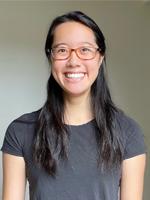
Zoë Wong
NIH Oxford Scholar
B.S. Biology and Psychology, University of Oregon, 2018
Dr. Neal Young (NHLBI) and
Prof. Beth Psaila (Oxford)
Immunology, Cancer biology, Genomics
Zoë first developed her interest in scientific research under the direction of Dr. Owen McCarty in Oregon Health and Sciences University’s Biomedical Engineering department. Her work focused on quantifying an ex vivo model of occlusive thrombus formation, which she presented at the International Society of Thrombosis and Haemostasis (Amsterdam, 2013). As an undergraduate, Zoë conducted four years of research in Dr. Karen Guillemin’s lab in the University of Oregon’s Institute of Molecular Biology. She studied host-microbe interactions in the Drosophila midgut, which formed the basis for her Honors Thesis. After graduating, Zoë joined Dr. Beth Kozel’s Vascular and Matrix Genetics lab at the NIH (NHLBI). She studied patients with atypical deletions of Williams Syndrome and characterized their clinical features.
Zoë will complete her DPhil training under the mentorship of Dr. Neal Young (NIH) and Dr. Bethan Psaila (Oxford). Her project will interrogate the impact of the tumor microenvironment on blood cancer immunotherapies using human bone marrow organoids.


